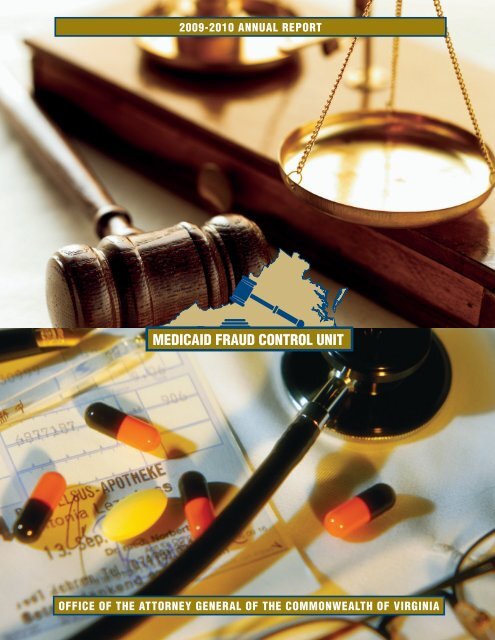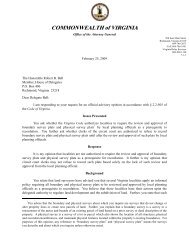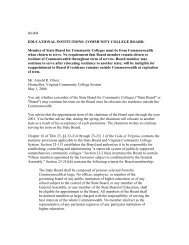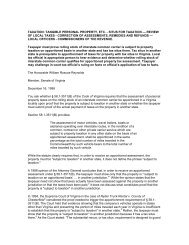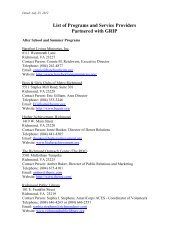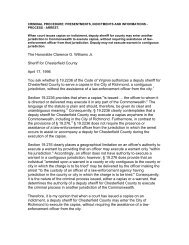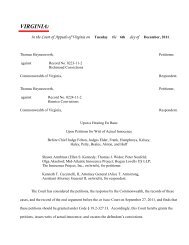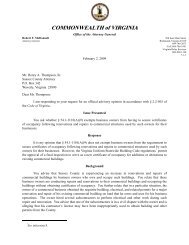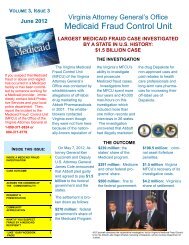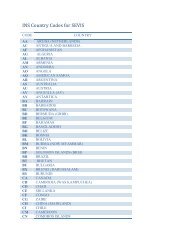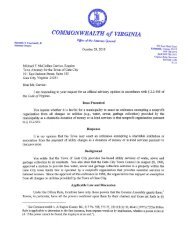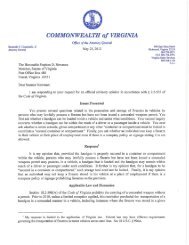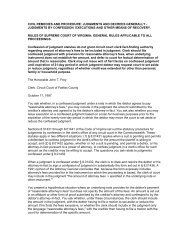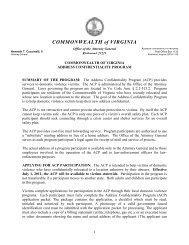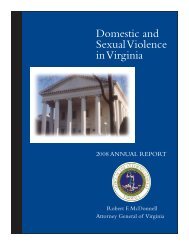MEDICAID FRAUD CONTROL UNIT - Office of the Attorney General
MEDICAID FRAUD CONTROL UNIT - Office of the Attorney General
MEDICAID FRAUD CONTROL UNIT - Office of the Attorney General
- No tags were found...
Create successful ePaper yourself
Turn your PDF publications into a flip-book with our unique Google optimized e-Paper software.
<strong>Attorney</strong> <strong>General</strong> Kenneth T. Cuccinelli, IIThe men and women working in <strong>the</strong> MedicaidFraud Unit continue to surpass milestones in <strong>the</strong>irfight to protect <strong>the</strong> health and welfare <strong>of</strong> <strong>the</strong>residents <strong>of</strong> <strong>the</strong> Commonwealth.We are pleased to <strong>of</strong>fer <strong>the</strong> Medicaid FraudControl Unit’s 2010 Annual Report.Medicaid Fraud Control Unit<strong>Office</strong> <strong>of</strong> <strong>the</strong> <strong>Attorney</strong> <strong>General</strong>900 East Main Street, Richmond, VA 23219(804) 786-2071iii
TABLE OF CONTENTSLETTER FROM DIRECTOR AND CHIEF. . . . . . . . . . . . . . . . . . . . . . . . . . . . . . . . . . . . . . . . . . . . . . . 3PREFACE. . . . . . . . . . . . . . . . . . . . . . . . . . . . . . . . . . . . . . . . . . . . . . . . . . . . . . . . . . . . . . . . . . . . . . . . . . 4STATUTORY AUTHORITY. . . . . . . . . . . . . . . . . . . . . . . . . . . . . . . . . . . . . . . . . . . . . . . . . . . . . . . . . . . . 5<strong>UNIT</strong> MISSION . . . . . . . . . . . . . . . . . . . . . . . . . . . . . . . . . . . . . . . . . . . . . . . . . . . . . . . . . . . . . . . . . . . . . 6OFFICE OF THE ATTORNEY GENERAL PERSONNEL. . . . . . . . . . . . . . . . . . . . . . . . . . . . . . . . . . . . 7ORGANIZATIONAL CHART . . . . . . . . . . . . . . . . . . . . . . . . . . . . . . . . . . . . . . . . . . . . . . . . . . . . . . . . . 8SIGNIFICANT CASES . . . . . . . . . . . . . . . . . . . . . . . . . . . . . . . . . . . . . . . . . . . . . . . . . . . . . . . . . . . . . . 10Criminal. . . . . . . . . . . . . . . . . . . . . . . . . . . . . . . . . . . . . . . . . . . . . . . . . . . . . . . . . . . . . . . . . . . . . . . . . . 14Commonwealth v. Barbara Ann Napier. . . . . . . . . . . . . . . . . . . . . . . . . . . . . . . . . . . . . . . . . 11Commonwealth v. Coleman Floyd . . . . . . . . . . . . . . . . . . . . . . . . . . . . . . . . . . . . . . . . . . . . . . 11Commonwealth v. James William Wright . . . . . . . . . . . . . . . . . . . . . . . . . . . . . . . . . . . . . . . 12Commonwealth v. JoAnn Williams. . . . . . . . . . . . . . . . . . . . . . . . . . . . . . . . . . . . . . . . . . . . . . 12Commonwealth v. Kadiatu Diallo. . . . . . . . . . . . . . . . . . . . . . . . . . . . . . . . . . . . . . . . . . . . . . . 13Commonwealth v. Linda Sluss Bishop, LPN. . . . . . . . . . . . . . . . . . . . . . . . . . . . . . . . . . . . . . 13Appeals. . . . . . . . . . . . . . . . . . . . . . . . . . . . . . . . . . . . . . . . . . . . . . . . . . . . . . . . . . . . . . . . . . . . . . . . . . 14United States v. Mohamed A. Abdelshafi. . . . . . . . . . . . . . . . . . . . . . . . . . . . . . . . . . . . . . . . 14Detailed Case Summary . . . . . . . . . . . . . . . . . . . . . . . . . . . . . . . . . . . . . . . . . . . . . . . . . . . . . . . . . . 15CIVIL INVESTIGATIONS SQUAD. . . . . . . . . . . . . . . . . . . . . . . . . . . . . . . . . . . . . . . . . . . . . . . . . . . . 16Civil. . . . . . . . . . . . . . . . . . . . . . . . . . . . . . . . . . . . . . . . . . . . . . . . . . . . . . . . . . . . . . . . . . . . . . . . . . . . . . 16Best Price Fraud: Aventis Settlement.. . . . . . . . . . . . . . . . . . . . . . . . . . . . . . . . . . . . . . . . . . . 16Medicaid Rebate Program Fraud: Innovator v. Non-innovator Classification. . . . . . 17Off-label Marketing and Kickbacks: Pfizer Settlement . . . . . . . . . . . . . . . . . . . . . . . . . . 17Detailed Case Summary . . . . . . . . . . . . . . . . . . . . . . . . . . . . . . . . . . . . . . . . . . . . . . . . . . . . . . . . . . 19CASE ACTIVITY SUMMARY. . . . . . . . . . . . . . . . . . . . . . . . . . . . . . . . . . . . . . . . . . . . . . . . . . . . . . . . 20ELDER ABUSE AND NEGLECT SQUAD. . . . . . . . . . . . . . . . . . . . . . . . . . . . . . . . . . . . . . . . . . . . . . 21<strong>UNIT</strong> PROJECTIONS. . . . . . . . . . . . . . . . . . . . . . . . . . . . . . . . . . . . . . . . . . . . . . . . . . . . . . . . . . . . . . . 22PROJECTIONS FOR 2010-2011 FISCAL YEAR . . . . . . . . . . . . . . . . . . . . . . . . . . . . . . . . . . . . . . . 23<strong>UNIT</strong> PERFORMANCE . . . . . . . . . . . . . . . . . . . . . . . . . . . . . . . . . . . . . . . . . . . . . . . . . . . . . . . . . . . . . 24Three Year Recovery Statistics Per Filled MFCU Position . . . . . . . . . . . . . . . . . . . . . . . . . . . . 24<strong>UNIT</strong> ACTIVITIES/EXPANSION. . . . . . . . . . . . . . . . . . . . . . . . . . . . . . . . . . . . . . . . . . . . . . . . . . . . . . 25ANNUAL CASE ACTIVITY SUMMARY. . . . . . . . . . . . . . . . . . . . . . . . . . . . . . . . . . . . . . . . . . . . . . . 26Fiscal Years 1982 through 2010. . . . . . . . . . . . . . . . . . . . . . . . . . . . . . . . . . . . . . . . . . . . . . . . . . . . 26Three-Year Recovery Average (per year) . . . . . . . . . . . . . . . . . . . . . . . . . . . . . . . . . . . . . . . . . . . 27Number <strong>of</strong> MFCU Staff - Three Year Average. . . . . . . . . . . . . . . . . . . . . . . . . . . . . . . . . . . . . . . 27Three-Year Average Recovered Per Number <strong>of</strong> Staff (per year). . . . . . . . . . . . . . . . . . . . . . 27PROPOSED 2010-2011 BUDGET . . . . . . . . . . . . . . . . . . . . . . . . . . . . . . . . . . . . . . . . . . . . . . . . . . . 282009-2010 EXPENDITURES . . . . . . . . . . . . . . . . . . . . . . . . . . . . . . . . . . . . . . . . . . . . . . . . . . . . . . . . 29TRAINING . . . . . . . . . . . . . . . . . . . . . . . . . . . . . . . . . . . . . . . . . . . . . . . . . . . . . . . . . . . . . . . . . . . . . . . . 30Training Provided. . . . . . . . . . . . . . . . . . . . . . . . . . . . . . . . . . . . . . . . . . . . . . . . . . . . . . . . . . . . . . . . . .31Dates and Personnel Providing Training. . . . . . . . . . . . . . . . . . . . . . . . . . . . . . . . . . . . . . . . . . . 32Training Received. . . . . . . . . . . . . . . . . . . . . . . . . . . . . . . . . . . . . . . . . . . . . . . . . . . . . . . . . . . . . . . . . 33Dates and Personnel Attending Training. . . . . . . . . . . . . . . . . . . . . . . . . . . . . . . . . . . . . . . . . . . 391
Kenneth T. Cuccinelli, II<strong>Attorney</strong> <strong>General</strong>The Honorable Kenneth T. Cuccinelli, II<strong>Attorney</strong> <strong>General</strong> <strong>of</strong> Virginia900 East Main StreetRichmond, VA 23219COMMONWEALTH <strong>of</strong> VIRGINIA<strong>Office</strong> <strong>of</strong> <strong>the</strong> <strong>Attorney</strong> <strong>General</strong>June 30, 2010900 East Main StreetRichmond, Virginia 23219804-786-2071FAX 804-786-1991Virginia Relay Services800-828-11207-1-1Dear <strong>General</strong> Cuccinelli:On October 1, 1982, <strong>the</strong> United States Department <strong>of</strong> Health and Human Services formally designated and certified<strong>the</strong> Virginia Medicaid Fraud Control Unit (MFCU or <strong>the</strong> Unit) as an integral part <strong>of</strong> <strong>the</strong> nationwide effort to deter fraudand <strong>the</strong> misapplication <strong>of</strong> funds by health care providers enrolled in <strong>the</strong> Commonwealth’s Medical Assistance Program,which is administered by <strong>the</strong> Virginia Department <strong>of</strong> Medical Assistance Services (DMAS). This year, as a result <strong>of</strong> ourcriminal and civil investigations, <strong>the</strong> MFCU has successfully recovered significant amounts <strong>of</strong> money wrongfully paid toproviders by Virginia’s Medicaid program. The MFCU achieved its fourth most successful year since its inception andobtained convictions <strong>of</strong> 13 healthcare providers in state and federal courts, with $25,390,467.21 <strong>of</strong> restitution orderedto be paid to Medicaid. In addition to maintaining its normal significant caseload, <strong>the</strong> members <strong>of</strong> MFCU also trainedeight new employees.The outstanding performance <strong>of</strong> <strong>the</strong> MFCU is attributable to a team effort, <strong>the</strong> Unit’s exceptional relationship witho<strong>the</strong>r state and federal agencies, and <strong>the</strong> continued support from you and your senior staff. The tremendous success<strong>of</strong> <strong>the</strong> Unit this year could not have been achieved without <strong>the</strong> persistent work performed by <strong>the</strong> men and women <strong>of</strong><strong>the</strong> MFCU, who spend many days away from families and friends while conducting surveillances, executing searchwarrants, analyzing records, conducting interviews, and prosecuting cases. The Unit’s commitment to <strong>the</strong> <strong>Office</strong> <strong>of</strong> <strong>the</strong><strong>Attorney</strong> <strong>General</strong> and its mission is why, in 2008, we were named <strong>the</strong> number one MFCU in <strong>the</strong> country by <strong>the</strong> UnitedStates Department <strong>of</strong> Health and Human Services, <strong>Office</strong> <strong>of</strong> Inspector <strong>General</strong> (HHS-OIG). The MFCU is proud to serveamong <strong>the</strong> nation’s leaders in combating fraud in <strong>the</strong> Medicaid program. We thank you for your continued support andencouragement.The report that follows reviews <strong>the</strong> first half <strong>of</strong> <strong>the</strong> 2009-2011 biennium, from July 1, 2009 to June 30, 2010, and setsforth <strong>the</strong> organization, operations, and accomplishments <strong>of</strong> <strong>the</strong> Unit.With kindest regards, I remainVery truly yours,Randall L. ClouseDirectorMedicaid Fraud Control UnitHealth Care Fraud and Elder Abuse Section3
PREFACEThe Virginia Medicaid Fraud Control Unit (MFCU or <strong>the</strong> Unit) <strong>of</strong> <strong>the</strong> <strong>Office</strong> <strong>of</strong> <strong>the</strong><strong>Attorney</strong> <strong>General</strong> was certified October 1, 1982, by <strong>the</strong> United States Department <strong>of</strong>Health and Human Services. The Unit is one <strong>of</strong> fifty similarly structured units throughout<strong>the</strong> United States. In deciding to establish a MFCU in Virginia, <strong>the</strong> <strong>General</strong> Assembly stated:The <strong>General</strong> Assembly finds and declares it to be in <strong>the</strong> public interestand for <strong>the</strong> protection <strong>of</strong> <strong>the</strong> health and welfare <strong>of</strong> <strong>the</strong> residents <strong>of</strong> <strong>the</strong>Commonwealth that a proper regulatory and inspection program beinstituted in connection with <strong>the</strong> providing <strong>of</strong> medical, dental and o<strong>the</strong>rhealth services to recipients <strong>of</strong> medical assistance. In order to effectivelyaccomplish such purpose and to assure that <strong>the</strong> recipient receivessuch services as are paid for by <strong>the</strong> Commonwealth, <strong>the</strong> acceptance by<strong>the</strong> recipient <strong>of</strong> such services and <strong>the</strong> acceptance by practitioners <strong>of</strong>reimbursement for performing such services shall authorize <strong>the</strong> <strong>Attorney</strong><strong>General</strong> or his authorized representative to inspect and audit all records inconnection with <strong>the</strong> providing <strong>of</strong> such services. Section 32.1-310, Code <strong>of</strong>Virginia, 1950, as amended.4 4
STATUTORY AUTHORITYIn 1981, <strong>the</strong> Virginia <strong>General</strong> Assembly enactedChapter 9, §§ 32.1-310 through 32.1-321 <strong>of</strong> <strong>the</strong> Code<strong>of</strong> Virginia to regulate medical assistance in <strong>the</strong>Commonwealth. This Chapter authorizes criminalsanctions for specific acts <strong>of</strong> Medicaid fraud and abuse.The duties and responsibilities <strong>of</strong> <strong>the</strong> Unit are set forth in § 32.1-320.In 1982, <strong>the</strong> Unit was established within <strong>the</strong> <strong>Office</strong><strong>of</strong> <strong>the</strong> <strong>Attorney</strong> <strong>General</strong> in accordance with federalrequirements. This Unit is separate and distinct from<strong>the</strong> Department <strong>of</strong> Medical Assistance Services (DMAS),which is <strong>the</strong> single state agency in <strong>the</strong> executive branchresponsible for <strong>the</strong> administration <strong>of</strong> <strong>the</strong> Medicaidprogram.In 1995, <strong>the</strong> <strong>General</strong> Assembly significantly amended<strong>the</strong> Medicaid fraud statutes by converting Virginia Code§ 32.1-314, <strong>the</strong> most frequently charged crime under <strong>the</strong>Medicaid fraud statutes, from alarceny-type <strong>of</strong>fense to afalse-claims <strong>of</strong>fense. The change eliminated <strong>the</strong> requirementthat <strong>the</strong> Commonwealth prove $200 or more waswrongfully taken from <strong>the</strong> program in order to securea felony conviction. Under <strong>the</strong> amended statute, <strong>the</strong>Commonwealth need only prove that a materially falsestatement was made in an application for reimbursementunder <strong>the</strong> program.In 2007, <strong>the</strong> Unit successfully proposed legislationto elevate <strong>the</strong> penalty for abuse or neglect <strong>of</strong> an incapacitatedadult that resulted in death to a Class 3 felony,which is a term <strong>of</strong> imprisonment <strong>of</strong> not less than fiveyears nor more than 20 years and a fine <strong>of</strong> not more than$100,000 (2007 Va. Acts cc. 562, 653). Before <strong>the</strong> 2007amendment, abuse <strong>of</strong> an incapacitated adult resulting inserious bodily injury or disease was a Class 4 felony punishableby a term <strong>of</strong> imprisonment <strong>of</strong> not less than twoyears nor more than 10 years and a fine <strong>of</strong> not more than$100,000. In 2007, <strong>the</strong> <strong>General</strong> Assembly also enacteda number <strong>of</strong> changes to health care fraud statutes inVirginia to ensure Virginia would be deemed compliantwith <strong>the</strong> federal Deficit Reduction Act <strong>of</strong> 2005. If deemedcompliant, Virginia would be allowed to keep an additional10% <strong>of</strong> <strong>the</strong> recoveries.• Amended Virginia Code § 8.01-216.3 to increase<strong>the</strong> minimum penalty from $5,000 to $5,500 andincrease <strong>the</strong> maximum penalty from $10,000 to$11,000;• Amended Virginia Code § 8.01-216.3 to allow<strong>the</strong> Virginia <strong>Attorney</strong> <strong>General</strong>’s <strong>Office</strong> to recoverattorney fees and costs incurred in its investigationand prosecution <strong>of</strong> qui tam actions;• Amended Virginia Code §§ 8.01-216.5 and8.01-216.6 to replace “motion for judgment” and“motion” with “complaint” (lines 55, 56-57, 59, 62,64, 77, and 78;• Amended Virginia Code § 8.01-216.9 to (1) extend<strong>the</strong> statute <strong>of</strong> limitations period; (2) extend <strong>the</strong>burden <strong>of</strong> pro<strong>of</strong> requirement; and (3) preventdefendants from denying civil liability if <strong>the</strong>y areconvicted in a criminal proceeding based on <strong>the</strong>same transaction or occurrence; and• Amended Virginia Code §§ 32.1-312 and32.1-313 to extend <strong>the</strong> statute <strong>of</strong> limitations andallow Virginia to bring a civil action for fraudagainst health care subcontractors that provide services or goods to Medicaid recipients, butdo not contract directly with Virginia’s stateprovider pursuant to a provider agreement.2007 Va. Acts, c. 569. The United States Department<strong>of</strong> Health and Human Services, <strong>Office</strong> <strong>of</strong> <strong>the</strong> Inspector<strong>General</strong> issued a ruling on March 13, 2007 that foundVirginia’s statutory scheme was in compliance.5
<strong>UNIT</strong> MISSIONThe Unit is charged with <strong>the</strong> investigation and prosecution <strong>of</strong> Medicaid providerswho conduct <strong>the</strong>ir businesses in a fraudulent or highly abusive manner. The intendedresult <strong>of</strong> this effort is to deter all providers <strong>of</strong> medical services from engaging in <strong>the</strong>setypes <strong>of</strong> behaviors.In order to achieve this goal, <strong>the</strong> Unit will:Conduct pr<strong>of</strong>essional and timely criminal investigations that lead to just results;Collaborate with o<strong>the</strong>r state and federal agencies involved in <strong>the</strong> battle agains<strong>the</strong>althcare fraud and patient abuse and neglect throughout <strong>the</strong> Commonwealth. In fact, <strong>the</strong> MFCU is uniquely positioned to take <strong>the</strong> lead in investigating and prosecutinghealthcare fraud and patient abuse and neglect in <strong>the</strong> Commonwealth;Seek alternatives to criminal prosecution, when appropriate, to reinforce and instill in<strong>the</strong> provider community a desire to comply with all regulations promulgated by <strong>the</strong>Virginia Department <strong>of</strong> Medical Assistance Services (DMAS);Provide educational resources to <strong>the</strong> community, law enforcement, and o<strong>the</strong>r agenciesthrough presentations on <strong>the</strong> work <strong>of</strong> <strong>the</strong> MFCU, and <strong>the</strong> publishing <strong>of</strong> a quarterlynewsletter and brochures which provide information on Medicaid fraud as well as elderand patient abuse and neglect;Refine internal operating procedures designed to produce timely investigative resultsand maximize Unit resources in order to promote efficient and thorough strategies foreach case;Promote effective communication between <strong>the</strong> Unit and DMAS, <strong>the</strong>reby increasing <strong>the</strong>number and quality <strong>of</strong> referrals;Maintain <strong>the</strong> highest standards <strong>of</strong> excellence through aggressive training on currentfraud trends and law enforcement tools in an attempt to better combat fraud in <strong>the</strong>Medicaid program; andProvide assistance related to nationwide civil and criminal healthcare fraud matters.America’s oldest English-speaking representative assemblyhas been meeting in <strong>the</strong> Virginia State Capitol since 1788.6
ORGANIZATIONAL CHART<strong>Office</strong> <strong>of</strong> <strong>the</strong> <strong>Attorney</strong> <strong>General</strong>Public Safety and Enforcement DivisionHealth Care Fraud and Elder Abuse SectionMedicaid Fraud Control UnitJune 30, 2010AdministrativeManagerUnit ProgramCoordinatorAdministrativeCoordinatorDeputy Director<strong>of</strong> InvestigationsChief <strong>of</strong>Elder AbuseChief InvestigatorProvider FraudUnitSr. CriminalInvestigatorCriminalInvestigatorInvestigativeSupervisorInvestigativeSupervisorInvestigativSupervisorCriminalInvestigatorSr. CriminalInvestigatorSr. CriminalInvestigatorAbingdonInvestigatoNurseInvestigatorCriminalInvestigatorInvestigativeAnalystAbingdonInvestigatoNurseInvestigatorNurseInvestigatorSr. CriminalInvestigatorAbingdonInvestigatoNurseInvestigatorCriminalInvestigatorSr. CriminalInvestigatorAbingdonInvestigatoNurseInvestigatorNOVASr. CriminalInvestigatorNOVACriminalInvestigatorAbingdonEvidenceManager/AnaNurseInvestigatorRichmondSr. CriminalInvestigatorNOVASr. CriminalInvestigatorRoanokeAnalystInvestigatorSr. CriminalInvestigatorSr. CriminalInvestigatorRoanoke8InvestigatorSr. CriminalInvestigatorRoanoke
<strong>Attorney</strong> <strong>General</strong>Chief Deputy<strong>Attorney</strong> <strong>General</strong>Deputy<strong>Attorney</strong> <strong>General</strong>ChiefHealth Care Fraud and Elder Abuse<strong>MEDICAID</strong> <strong>FRAUD</strong> <strong>CONTROL</strong> <strong>UNIT</strong>VIRGINIA OFFICE OF THE ATTORNEY GENERALDirectorMedicaid Fraud UnitDeputy DirectorProsecution &LitigationMFCU ComputerForensic-ITSupervisorChief AuditorAudit UnitChief ProsecutorCriminalProsecutions UnitChief <strong>of</strong> CivilInvestigationUnitForensic & ITSpecialistAuditorAbingdonLead AAGLead AAGLead AAGeInvestigatorForensicAccountantNOVAAAGProsecutorAAGAAGrInvestigatorAuditorAAGProsecutorNorfolkCivilInvestigatorAAGrInvestigatorSenior AuditorAAGProsecutorRoanokeParalegalAAGrInvestigatorAuditorAAGProsecutorNOVALegalSecretaryComputerProgrammerrCriminalInvestigatorSSA AshlandAuditorParalegalComputerProgrammerSecretarylystCriminalInvestigatorSSA AshlandAAGAAGParalegalAAG9
SIGNIFICANT CASESThe following are brief summaries <strong>of</strong> significantcases that resulted in <strong>the</strong> successful convictions<strong>of</strong> numerous fraudulent healthcare providers in<strong>the</strong> Commonwealth during fiscal year 2009-2010.10
CRIMINAL CASESCOMMONWEALTH V. BARBARA ANN NAPIERCHECKER CAB A/K/A CHECKER EZ CABOn December 3, 2009, Barbara Ann Napier (Napier)pled guilty to three counts <strong>of</strong> Medicaid Fraud (Va. Code §32.1-314) and three counts <strong>of</strong> Obtaining Money by FalsePretenses (Va. Code § 18.2-178) in Albemarle CountyCircuit Court. On March 23, 2010, Napier appeared inAlbemarle County Circuit Court for sentencing. Napierwas sentenced to 42 years’ incarceration with 40 yearssuspended, leaving her an active term <strong>of</strong> 2 years’imprisonment. Additionally, Napier was ordered to pay$420,000.00 in restitution. The Commonwealth’s evidenceshowed that from 2006 through 2008, Napiercontrolled <strong>the</strong> billing and management <strong>of</strong> Checker Cab.Checker Cab is a transportation company under contractwith Medicaid HMO Virginia Premier to provide transportationservices to Medicaid recipients. Napier overbilledVirginia Premier approximately $420,000 by submittingfalse claims for reimbursement that reflected more milesthan actually traveled. Fur<strong>the</strong>r, Napier fraudulently representedthat “after-hours” services were provided, when infact services were provided during normal business hours.COMMONWEALTH V. COLEMAN FLOYDREMEDIES, INC.On August 4, 2009, a Grand Jury sitting in <strong>the</strong> City <strong>of</strong>Norfolk, Virginia, indicted Coleman Floyd (Floyd) on fourcounts <strong>of</strong> Medicaid Fraud (Va. Code § 32.1-314). Floyd andhis wife are <strong>the</strong> owners <strong>of</strong> Remedies, Inc., a durable medicalequipment company operating in Norfolk. Remediescame to <strong>the</strong> attention <strong>of</strong> DMAS during a September 2006audit <strong>of</strong> <strong>the</strong> company. The audit indicated that Floyd wasbilling for adult size diapers and briefs when pediatricdiapers were being supplied. The MFCU’s investigationshowed Floyd took deliberate steps to upcode productssupplied to his clients. The alleged loss to <strong>the</strong> VirginiaMedicaid Program was $250,431.80. On December 2,2009, in <strong>the</strong> Circuit Court for <strong>the</strong> City <strong>of</strong> Norfolk, Floydpled guilty to four counts <strong>of</strong> Medicaid fraud, in violation<strong>of</strong> Va. Code § 32.1-314. Pursuant to a plea agreement,Floyd was sentenced to 12 years in <strong>the</strong> Department <strong>of</strong>Corrections with 11 years suspended, giving him a totalactive sentence <strong>of</strong> 12 months to be followed by a term <strong>of</strong>12 years <strong>of</strong> supervised probation. Additionally, Floyd wasordered to pay $250,431.80 in restitution to Medicaidand will be barred from participating as a health careprovider.11
COMMONWEALTH V. JAMES WILLIAM WRIGHTNHC HealthcareOn August 25, 2009, James William Wright (Wright)was indicted for four counts <strong>of</strong> Aggravated SexualBattery, in violation <strong>of</strong> Va. Code § 18.2-67.3, in connectionwith his employment at NHC Healthcare (NHC), a nursingfacility in Bristol, Virginia. Wright was employed as aCertified Nursing Assistant (CNA) with NHC from 1999 to2007. MFCU investigators uncovered multiple incidents<strong>of</strong> sexual misconduct involving Wright and elderly NHCresidents. MFCU investigators were able to substantiateallegations <strong>of</strong> misconduct, identify eyewitnesses toWright’s conduct, and obtain an admission <strong>of</strong> misconductfrom Wright himself. Wright sexually molestedelderly residents under his care while employed withNHC. On January 7, 2010, Wright entered an Alford guiltyplea to four counts <strong>of</strong> aggravated sexual battery, in violation<strong>of</strong> Va. Code §18.2-67.3. On May 14, 2010, in CircuitCourt for <strong>the</strong> City <strong>of</strong> Bristol, Wright was sentenced toserve 80 years with 20 years suspended (20 years withfive years suspended on each charge) or 60 years’ activeincarceration for committing aggravated sexual batteryagainst four elderly residents at NHC-Bristol. In addition,Wright was ordered to pay a $10,000 fine for each <strong>of</strong> <strong>the</strong>four counts (a total <strong>of</strong> $40,000), will be placed on probationupon release, and will be required to register as a sex<strong>of</strong>fender.COMMONWEALTH V. JOANN WILLIAMSOn September 15, 2009, <strong>the</strong> Court <strong>of</strong> Appeals <strong>of</strong>Virginia affirmed Joann Williams’ (Williams) convictionfor felony neglect <strong>of</strong> an incapacitated adult (Va. Code §18.2-369). Williams was convicted in <strong>the</strong> Prince WilliamCounty Circuit Court in Manassas, Virginia on January 7and 8, 2008. On appeal, Williams argued she was not <strong>the</strong>“responsible party” under statute and that her conductwas not knowing and willful neglect. Williams was aPersonal Care Assistant who was responsible for <strong>the</strong> care<strong>of</strong> a 55 year old incapacitated adult. Paramedics foundher client in a recliner, with his shirt soaked in drool andhis shorts soaked in urine. His legs were swollen andhad untreated sores. When his discolored socks wereremoved, <strong>the</strong> paramedics found each foot was infestedwith hundreds <strong>of</strong> maggots. He didnot appear to have been cleaned orba<strong>the</strong>d recently and <strong>the</strong> apartmentwas “very unsanitary,” with catfeces, dirty dishes and trash in <strong>the</strong>kitchen. The client was unable towalk or speak and was transportedto a local hospital and, due to hisextremely poor hygienic condition,he had to be decontaminated priorto treatment. In addition to problemsnoted by paramedics, <strong>the</strong>doctor found a large decubitus ulcer in <strong>the</strong> sacrum thathad been developing for at least one month. Culturesfrom <strong>the</strong> examination established that <strong>the</strong> client haddeveloped a heavy bacterial infection involving staphaureus involving <strong>the</strong> coccyx, right leg, and foot. He washospitalized for a week and <strong>the</strong>n discharged to a skillednursing facility. The client died <strong>of</strong> Amyotrophic LateralSclerosis (ALS) (also known as “Lou Gerhig’s Disease”)complications in hospice a month later. The evidenceat trial also established that Williams was paid to takecare <strong>of</strong> <strong>the</strong> client, she was <strong>the</strong> only person that tookcare <strong>of</strong> him, and she had allegedly just cleaned him up<strong>the</strong> morning he was found by paramedics. In affirmingher conviction, <strong>the</strong> Court found it was irrelevant that<strong>the</strong>re were o<strong>the</strong>r “responsible persons”who may have also neglectedhim because <strong>the</strong> Commonwealthonly had to prove that Williamswas “a responsible person,” and<strong>the</strong> Commonwealth had done so.The Court also found <strong>the</strong> evidenceestablished Williams was aware <strong>of</strong><strong>the</strong> client’s condition and failed tocare or seek care for him, and tha<strong>the</strong>r failures constituted knowingand willful neglect.12
COMMONWEALTH V. KADIATU DIALLOPOTOMAC CENTER GENESIS ELDERCAREOn February 3, 2010, in <strong>the</strong> Arlington County CircuitCourt in a jury trial, Kadiatu Diallo (Diallo) was foundguilty <strong>of</strong> two counts <strong>of</strong> assault (Va. Code § 18.2-57).The jury sentenced Diallo to one day incarceration oneach count and a $2,500 fine on each count. Diallo wascharged with assault for throwing popcorn in a tauntingand bullying manner at a resident at Potomac Centerin Arlington. The patient was bedridden and sufferedfrom dementia. Diallo was a Certified Nursing Assistantresponsible for providing care for <strong>the</strong> patient.COMMONWEALTH V. LINDA SLUSS BISHOP, LPNMountain Regional Care Services, Inc.On June 23, 2009, Linda S. Bishop (Bishop ) wasindicted on one count <strong>of</strong> misdemeanor patient abuse(Va. Code § 18.2-369) by a Grand Jury in <strong>the</strong> Scott CountyCircuit Court, Scott County, Virginia. Bishop, a LicensedPractical Nurse, was employed by Mountain RegionalPersonal Care Services (MRPCS) in Duffield, Virginia, tocare for an incapacitated Medicaid recipient. MRPCSreported <strong>the</strong> alleged abuse and an investigation was initiated.A MFCU investigator interviewed Bishop at herhome. Bishop admitted to slapping <strong>the</strong> recipient out<strong>of</strong> frustration. The investigation did not reveal that <strong>the</strong>recipient suffered serious bodily injury as a result <strong>of</strong> <strong>the</strong>assault. Bishop pled no contest to misdemeanor Abuse<strong>of</strong> an Incapacitated Adult (Va. Code § 18.2-369) andwas sentenced on Monday, October 5th, 2009 in ScottCounty Circuit Court to 30 days in jail (suspended) and24 months unsupervised probation (12 months withgood behavior) to include an agreement not to performhome health care. Ms. Bishop was also ordered to pay allcourt fines/costs within <strong>the</strong> next 6 months.Members <strong>of</strong> <strong>the</strong> Unit and o<strong>the</strong>rs meet with <strong>Attorney</strong> <strong>General</strong> Kenneth T. Cuccinelli, II.13
APPEALS<strong>UNIT</strong>ED STATES V. MOHAMED A. ABDELSHAFI592 F.3d 602 (4th Cir. 2010).Mohamed A. Abdelshafi (Abdelshafi) was convictedin federal district court on fifteen counts <strong>of</strong> health carefraud, in violation <strong>of</strong> 18 U.S.C. § 1347, and two counts<strong>of</strong> aggravated identity <strong>the</strong>ft, in violation <strong>of</strong> 18 U.S.C. §1028A. Abdelshafi, who owned and operated a medicaltransportation company, executed a scheme to defrauda Virginia Medicaid HMO by submitting: inflated reimbursementclaims that reflected more miles than actuallytraveled and reimbursement claims for trips thatnever occurred. Abdelshafi’s use <strong>of</strong> Medicaid recipient’snames, dates <strong>of</strong> births, and Medicaid identification numberson <strong>the</strong> fraudulent claim forms to establish legitimacyfor <strong>the</strong> claims formed <strong>the</strong> basis for <strong>the</strong> charges <strong>of</strong>aggravated identity <strong>the</strong>ft. On appeal, Abdelshafi contendedthat he could not be convicted <strong>of</strong> aggravatedidentity <strong>the</strong>ft because he did not steal <strong>the</strong> patient identifiershe used on claims for reimbursement; and thathis sentence on <strong>the</strong> health care fraud counts shouldbe vacated because he should not have received anenhancement for abusing a position <strong>of</strong> trust. The FourthCircuit Court <strong>of</strong> Appeals, relying on <strong>the</strong> plain language<strong>of</strong> <strong>the</strong> statute, affirmed Abdelshafi’s convictions holdingthat Abdelshafi’s conduct fell within <strong>the</strong> purview <strong>of</strong> <strong>the</strong>aggravated identity <strong>the</strong>ft statute. The Court determinedthat nothing within <strong>the</strong> plain language <strong>of</strong> <strong>the</strong> statuterequired that Abdelshafi steal <strong>the</strong> personal patient identifiershe used on his fraudulent claim submissions. TheCourt fur<strong>the</strong>r ruled that <strong>the</strong> sentencing enhancement forabuse <strong>of</strong> a position <strong>of</strong> trust was correctly applied by <strong>the</strong>District Court.The Commonwealth <strong>of</strong> Virginia’s Wall <strong>of</strong> Honor honoring its Heroes who have diedserving in <strong>the</strong> Global War on Terrorism. This touching tribute is housed in <strong>the</strong> <strong>Office</strong><strong>of</strong> <strong>the</strong> <strong>Attorney</strong> <strong>General</strong> located in <strong>the</strong> Pocahontas Building in downtown Richmond.14
DETAILED CASE SUMMARYCriminalJuly 1, 2009 – June 30, 2010Category Carried Over Opened Closed PendingInstitutionsNursing Facilities 1 0 0 1Hospitals 0 0 0 0O<strong>the</strong>r Institutions 1 0 0 1PractitionersMD/OD 4 2 2 4Dentists 1 0 1 0Podiatrists 1 0 0 1Psychiatrist/Psychologist 4 3 0 7O<strong>the</strong>r 0 0 0 0Medical SupportPharmacy 0 1 0 1Durable Medical Equipment 5 0 3 2Laboratories 0 0 0 0Medical Transportation 4 0 1 3Home Health Agencies 8 15 5 18Rehabilitation Therapists 0 0 0 0O<strong>the</strong>r 4 2 2 4Patient Abuse and NeglectPatient Abuse 2 2 1 3Corporate Neglect 5 3 4 4Patient FundsPatient Funds 2 1 1 2Total 42 29 20 5115
CIVIL CASESBEST PRICE <strong>FRAUD</strong>: AVENTIS SETTLEMENTIf a pharmaceutical company wants to be able toparticipate in <strong>the</strong> Medicaid program, <strong>the</strong> company mustagree to report to <strong>the</strong> government <strong>the</strong>ir “best prices” forsales <strong>of</strong> <strong>the</strong>ir drugs to retail, for-pr<strong>of</strong>it customers. Thecompany must rebate to state Medicaid programs <strong>the</strong>difference between <strong>the</strong> price initially charged Medicaidfor <strong>the</strong>ir drugs and <strong>the</strong>ir Best Price (BP) for <strong>the</strong> drugduring each year. If <strong>the</strong> drug company fails to report discountsor o<strong>the</strong>r payments <strong>of</strong>fered to pharmacies or o<strong>the</strong>rproviders, this failure could improperly reduce <strong>the</strong> rebateowed to a state’s Medicaid program by millions as illustratedby <strong>the</strong> settlement with Aventis Pharmaceuticals,Inc. (API).API entered into a settlement agreement with <strong>the</strong>United States, Virginia, and o<strong>the</strong>r states to resolve claimsin several qui tam cases filed in <strong>the</strong> United States DistrictCourt for <strong>the</strong> District <strong>of</strong> Massachusetts that alleged APIcommitted BP fraud. The allegations concerned threedrugs: Azamacort (triamcinolone acetonide), a steroidbased anti-inflammatory nasal spray which prevents <strong>the</strong>release <strong>of</strong> substances in <strong>the</strong> body that cause inflammationand is used to prevent asthma attacks; Nasacortand Nasacort AQ (triamcinolone nasal), nasal spraysthat are used for <strong>the</strong> relief <strong>of</strong> seasonal and year-roundnasal allergy symptoms in adults and children as youngas 2 years. All three drugs were manufactured andmarketed by API and its predecessor, Rhône-PoulencRorer Pharmaceuticals, Inc. (collectively referred to asAPI). API entered into private label sales contracts witho<strong>the</strong>r health care providers and sold <strong>the</strong> drugs to <strong>the</strong>mat discounted prices and placed <strong>the</strong>m in special packagingsubmitted for rebates under <strong>the</strong> o<strong>the</strong>r provider’sNational Drug Codes (NDC) instead <strong>of</strong> API’s NDCs. API’sfailure to report <strong>the</strong> discounted prices caused <strong>the</strong> statesto receive lower rebates than <strong>the</strong>y would have receivedif <strong>the</strong> discounts had been reported. By failing to include<strong>the</strong> discounts, API knowingly made false statements todecrease its obligations for payment to <strong>the</strong> MedicaidProgram in violation <strong>of</strong> federal and state False Claimsstatutes. The settlement resolves false claims submittedby API from October 1, 1995 through September 30,2000, during which time API reported to <strong>the</strong> Centers forMedicare and Medicaid Services (CMS) false BPs to avoidpaying higher quarterly drug rebates to <strong>the</strong> states forAzamacort, Nasacort and Nasacort AQ.Under <strong>the</strong> settlement agreement, API paid$89,007,824 plus interest to settle potential federal andstate claims, from which <strong>the</strong> United States received$48,954,303, and <strong>the</strong> remaining $40,053,521 was distributedto <strong>the</strong> states. Virginia’s state and federal share <strong>of</strong> <strong>the</strong>settlement was $1,626,759.14. The Virginia Department<strong>of</strong> Medical Assistance Services received <strong>the</strong> state share <strong>of</strong><strong>the</strong> settlement plus interest in <strong>the</strong> amount <strong>of</strong> $818,432.84in November, 2009.CIVIL <strong>UNIT</strong>16Members <strong>of</strong> MFCU’s Civil Unit include: (clockwise starting at <strong>the</strong> rearleft) Erica Bailey, Michele Stanley, Bobby Powell, Kristy Knighton, RandyDavis, Angela Axselle, Mike Judge, Clay Garrett, Candice Hooper, Lelia Beck,Latarsha Tyler, and Tracey Sanders.
OFF-LABEL MARKETING AND KICKBACKS: PFIZER SETTLEMENTTwo common healthcare fraud schemes that healthcare fraud investigators encounter are <strong>of</strong>f-label marketingand kickbacks. The two schemes are not onlycommon, but <strong>of</strong>ten are used simultaneously toward <strong>the</strong>same end – increasing or maintaining market share. Offlabelmarketing occurs when a company publishes informationconcerning a drug product that is false, unsubstantiatedor not supported by <strong>the</strong> drug’s FDA-approvedlabel. Although a doctor is free to prescribe a drug foran <strong>of</strong>f-label use, a pharmaceutical company is prohibitedfrom marketing a drug for <strong>of</strong>f-label uses. See 21 U.S.C. §331 (2007). The federal Anti-Kickback Statute, 42 U.S.C.§ 1320-7b (b), bars transactions intended to encouragepatient referrals or o<strong>the</strong>r business, or to compensateo<strong>the</strong>r parties for making those referrals using federalfunds. Examples <strong>of</strong> illegal kickbacks may involve paidremuneration to physicians through speaker programs,preceptorship agreements, tutorials, and focus groupsto reward physicians for writing prescriptions for acompany’s drugs. The investigation into <strong>the</strong> complaintsregarding Pfizer that led to a settlement last year demonstrateshow a pharmaceutical company may use <strong>of</strong>f-labelmarketing and kickbacks toward <strong>the</strong> same end.The Virginia MFCU assisted <strong>the</strong> National Association<strong>of</strong> Medicaid Fraud Control Units’ Negotiating Team(NAMFCU) in negotiating a settlement following an investigation<strong>of</strong> <strong>of</strong>f-label marketing and kickbacks by Pfizer,Inc. The civil settlement resolved fraud claims raised inseven qui tam cases filed in United States District Courtsfor <strong>the</strong> District <strong>of</strong> Massachusetts, <strong>the</strong> Eastern District <strong>of</strong>Pennsylvania, and <strong>the</strong> Eastern District <strong>of</strong> Kentucky. Thefalse claims involved <strong>of</strong>f-label marketing and kickbackschemes used by Pfizer to promote <strong>the</strong> sales <strong>of</strong> Bextra,Lyrica, Geodon, and Zyvox; and kickback schemes toincrease sales <strong>of</strong> Aricept, Celebrex, Lipitor, Norvasc,Relpax, Viagra, Zithromax, Zol<strong>of</strong>t and Zyrtec. Under <strong>the</strong>settlement agreement, Pfizer paid $1 billion plus interestto settle <strong>the</strong> civil claims in this case. Approximately $705million <strong>of</strong> that amount was set aside for state Medicaiddamages and penalties.The settlement covered false claims submitted tostate Medicaid programs for reimbursement <strong>of</strong> Bextra,Geodon, Lyrica, and Zyvox prescriptions, which werecaused by improper <strong>of</strong>f-label marketing and kickbackschemes. The settlement also included reimbursements<strong>of</strong> Aricept, Celebrex, Lipitor, Norvasc, Relpax, Viagra,Zithromax, Zol<strong>of</strong>t and Zyrtec prescriptions that werecaused by unlawful kickbacks. A large portion <strong>of</strong> <strong>the</strong> civilsettlement and <strong>the</strong> criminal plea were based on Pfizer’s<strong>of</strong>f-label marketing <strong>of</strong> Bextra, Geodon, Lyrica, and Zyvox.Under <strong>the</strong> terms <strong>of</strong> <strong>the</strong> settlement agreement, <strong>the</strong>United States received approximately $668.4 million<strong>of</strong> <strong>the</strong> civil settlement. The remaining $331.4 millionwas distributed to <strong>the</strong> states. Virginia’s total federaland state Medicaid damages were $11,887,143.19, <strong>of</strong>which $5,645,383.26 represents <strong>the</strong> federal share and$6,455,679.69 represents <strong>the</strong> amount paid to <strong>the</strong> VirginiaDepartment <strong>of</strong> Medical Assistance Services under <strong>the</strong>settlement agreement.As part <strong>of</strong> <strong>the</strong> settlement <strong>of</strong> <strong>the</strong> <strong>of</strong>f-label marketingclaims for Bextra, Pfizer’s subsidiary Pharmacia & UpjohnCompany pled guilty to a felony Information filed in<strong>the</strong> United States District Court for <strong>the</strong> Eastern District<strong>of</strong> Massachusetts. The Information charged Pharmaciawith one-count <strong>of</strong> misbranding in violation <strong>of</strong> 21 U.S.C.§§ 331(a), 331(a)(1) and 335(f)(1) in that Pfizer marketedBextra for treatment <strong>of</strong> non-FDA approved medical conditions.As part <strong>of</strong> its plea agreement, Pfizer agreed topay record criminal fines and forfeitures <strong>of</strong> $1.3 billion.The total state and federal civil and criminal resolution-- $2.3 billion -- represents <strong>the</strong> largest recovery in a healthcare fraud investigation in United States history.18
DETAILED CASE SUMMARYCivilJuly 1, 2009 – June 30, 2010Category Carried Over Opened Closed PendingInstitutionsNursing Facilities 1 0 1 0Hospitals 2 1 2 1O<strong>the</strong>r Institutions 0 0 0 0PractitionersMD/OD 0 1 0 1Dentists 1 0 0 1Podiatrists 0 0 0 0Psychiatrist/Psychologist 0 0 0 0O<strong>the</strong>r 2 0 0 2Medical SupportDurable Medical Equipment 8 8 1 15Laboratories 4 6 0 10Pharmaceutical Companies 122 60 26 156Transportation 0 0 0 0Home Health 2 0 0 2Rehabilitation Therapists 0 0 0 0O<strong>the</strong>r 4 3 0 7Patient Abuse and NeglectCorporate Neglect 0 1 0 1Total 146 80 30 19619
CASE ACTIVITY SUMMARYThe following is a brief statistical summary <strong>of</strong> cases investigated fromJuly 1, 2009 – June 30, 2010CasesCases carried over 188Cases opened Criminal 29Civil 80Total 109Cases Closed With criminal resolution 8With civil resolution 8Insufficient evidence/no fur<strong>the</strong>r action 34Total 50Indicted cases pending (7/1/2009) 5Total cases pending (criminal and civil) 247Criminal Prosecution/RecoveryIndictments (individuals) 22Convictions 13Dismissed 1Acquittals 1Total length <strong>of</strong> probation940 monthsTotal incarceration time2433 monthsTotal suspended incarceration time2053 monthsTotal hours <strong>of</strong> community service0 hoursProviders terminated from program upon conviction 13Ordered restitutions, reimbursements, criminal fines and interest $826,580.16Civil Recovery - including Affirmative Civil Enforcement (ACE)Settlements/reimbursements received $24,563,887.05Investigative costs received $0Total $25,390,467.2120
ELDER ABUSE AND NEGLECT SQUADThe Elder Abuse and Neglect Unit <strong>of</strong> <strong>the</strong> Virginia<strong>Attorney</strong> <strong>General</strong>’s Medicaid Fraud Control Unit (MFCU)investigates allegations <strong>of</strong> abuse or neglect <strong>of</strong> elderlyand incapacitated adults receiving Medicaid benefits in<strong>the</strong> Commonwealth. To keep up with a large caseload,two investigators and three nurse investigators will beadded to <strong>the</strong> Unit after July 1, 2010 for a total staff <strong>of</strong> tenand <strong>the</strong> Chief. As a result <strong>of</strong> this networking effort, collegialrelationships have developed between <strong>the</strong> MFCUand <strong>the</strong> various agencies, and referrals are arriving at arapid pace. The Elder Abuse and Neglect Unit strives toensure rapid response to referrals, effective investigations,and successful outcomes that will ensure Virginia’svulnerable adults receive <strong>the</strong> highest quality <strong>of</strong> care possiblein both home and institutional settings.Unit Program Coordinator Patricia Cooper-Lewisand <strong>Attorney</strong> <strong>General</strong> Kenneth T. Cuccinelli, II.Paralegal Kimberly Wilborn and AdministrativeCoordinator Hamilton Roye.21
<strong>UNIT</strong> PROJECTIONSThe MFCU has an outstanding working relationshipwith state, local and federal agencies. Some <strong>of</strong> <strong>the</strong>key partner agencies are <strong>the</strong> Department <strong>of</strong> MedicalAssistance Services’, <strong>the</strong> <strong>Office</strong>s <strong>of</strong> <strong>the</strong> United States<strong>Attorney</strong> for <strong>the</strong> Eastern and Western Districts <strong>of</strong>Virginia, <strong>the</strong> Federal Bureau <strong>of</strong> Investigations, Health andHuman Services’ <strong>Office</strong> <strong>of</strong> Inspector <strong>General</strong>, InternalRevenue Services’ Criminal Investigation Division, <strong>the</strong>Virginia Department <strong>of</strong> Health Pr<strong>of</strong>essions, <strong>the</strong> VirginiaDepartment <strong>of</strong> Health, <strong>the</strong> Virginia Department <strong>of</strong> SocialServices, and local law enforcement. <strong>Attorney</strong> <strong>General</strong>Kenneth T. Cuccinelli’s and former <strong>Attorney</strong> <strong>General</strong> BillMims’ approach to <strong>the</strong> investigation <strong>of</strong> major fraud cases,in conjunction with o<strong>the</strong>r state, local, and federal agencies,contributed to <strong>the</strong> positive results obtained by <strong>the</strong>Unit last year.At <strong>the</strong> end <strong>of</strong> <strong>the</strong> 2009-2010 reporting year, <strong>the</strong>Unit had 51 active criminal investigations <strong>of</strong> healthcareproviders located throughout <strong>the</strong> Commonwealth. Inaddition, 22 have been indicted and were awaiting trialor sentencing in federal court. The Civil InvestigationsSquad had opened 80 new civil cases.The Unit will continue to participate in joint federaland state task forces to investigate and developcomplex cases dealing with provider fraud in <strong>the</strong> feefor-servicecommunity and <strong>the</strong> institutional neglectcases <strong>of</strong> patients in nursing homes. The Unit will alsocontinue to work closely with <strong>the</strong> <strong>Office</strong>s <strong>of</strong> <strong>the</strong> UnitedStates <strong>Attorney</strong> for <strong>the</strong> Eastern and Western Districts <strong>of</strong>Virginia, and <strong>the</strong> Affirmative Civil Enforcement Programto pursue Medicaid providers through <strong>the</strong> Federal FalseClaims Act and <strong>the</strong> Virginia Fraud Against Taxpayers Act.During state fiscal year 2010-2011, <strong>the</strong> Unit projects that<strong>the</strong> investigative, prosecutive, and civil recovery efforts<strong>of</strong> <strong>the</strong> Unit will result in 16 convictions, with combinedcriminal and civil recoveries <strong>of</strong> more than $30,000,000.V I R G I N I A A T T O R N E YG E N E R A L ’ S O F F I C ES P E C I A L P O I N T SO F I N T E R E S T :• Services• Case SpotlightI N S I D E T H I SI S S U E :Types <strong>of</strong> MedicaidBenefitsWho is eligiblefor MedicaidWhere to reportMedicaid fraudWhere to reportrecipient fraudVirginia Medicaid Fraud Control UnitV O L U M E 1 , I S S U E 2What Services are Provided Under MedicaidDid you know thatindividual statesdetermine what <strong>the</strong>irrespective Medicaidplans provide.However, <strong>the</strong>re aresome mandatory federalrequirements that statesmust meet in order toreceive federal fundingmatches. Thoserequired servicesinclude:• Inpatient hospitalservices• Physician services• Nurse-midwifeservices• Nursing facility servicesfor persons aged 21 orolder• Vaccines for children• Prenatalcare• Outpatienthospitalservices• Pediatric andfamily nurse practitionerservices• Home health care forpersons eligible for skillednursing services• Rural health clinic services• Laboratory and x-rayservices• Federally qualified healthcenter(FQHC) servicesand ambulatory services• Family planning servicesand supplies• Early and periodicscreening, diagnostic,and treatmentJ U N E 2 0 1 0services for childrenunder age 21States may alsoprovide optionalservices such as:• Transportationservices• Home and community-basedcare to certainpersons withchronic impairments• Diagnostic services• Prescribed drugs andpros<strong>the</strong>tic devicesIf you suspect that Medicaid fraud or abuse, neglect orexploitation has occurred in a Medicaid facility or hasbeen committed by someone working for a Medicaidprovider, immediately report <strong>the</strong> incident to <strong>the</strong>Medicaid Fraud Control Unit (MFCU) <strong>of</strong> <strong>the</strong> <strong>Office</strong> <strong>of</strong><strong>the</strong> Virginia <strong>Attorney</strong> <strong>General</strong> at 1-800-371-0824 or804-371-0779.22In 2010, <strong>the</strong> MFCU began publishing a quarterly Newsletter that includes recentcases, tips, fact sheets and o<strong>the</strong>r pertinent information on Medicaid fraud andelder and patient abuse and neglect.
PROJECTIONS FOR 2010-2011 FISCAL YEARCategory Closed PendingInstitutionsElder Abuse 3 8Nursing Homes/Corporate Neglect 1 4Hospitals 2 0Home Health Agencies 7 3PractitionersDentists 0 0Doctors 2 2Psychiatrist/Psychologist 3 2O<strong>the</strong>r 10 10Medical SupportDurable Medical Equipment 11 5Laboratories 5 2Pharmacies/Pharmaceuticals 80 25Medicaid Transportation 3 0Rehabilitation Therapists 5 0Total 132 61Projected Criminal and Civil Recoveries $30,000,000Projected Criminal Convictions and Civil Recoveries 1623
<strong>UNIT</strong> PERFORMANCEIn 1982, <strong>the</strong> United States Department <strong>of</strong> Health and Human Services certified<strong>the</strong> Virginia MFCU as <strong>the</strong> nation’s thirty-first Medicaid Fraud Control Unit. Over <strong>the</strong>past twenty-eight years, <strong>the</strong> Virginia MFCU has been responsible for <strong>the</strong> successfulprosecution <strong>of</strong> over 263 providers in cases that involved patient abuse and neglect or<strong>the</strong> commission <strong>of</strong> fraudulent acts against <strong>the</strong> Virginia Medicaid program. In addition toprosecuting those responsible for healthcare fraud and/or abuse, <strong>the</strong> Unit has recovered$780,977,738.21 in criminal restitution, asset forfeiture, civil judgments, and settlements.The Medicaid Fraud Control Unit was extremely successful in fiscal year 2009-2010,particularly through its participation in multi-agency investigations. The Unit ended <strong>the</strong>fiscal year with 13 convictions and total recoveries from criminal and civil investigations<strong>of</strong> $25,390,467.21.Three Year Recovery StatisticsPer MFCU EmployeeMFCU recovered an average <strong>of</strong> $198,032,584.74 per year over <strong>the</strong> past threeyears. The MFCU has averaged 48 staff members per year over <strong>the</strong> past threeyears. The recovery average per filled MFCU position for <strong>the</strong> past three years is$4,124,678.85 per person.24Section Chief for MFCU Steve Buck, Chief Prosecutor David Tooker, andAssistant <strong>Attorney</strong> <strong>General</strong> Eric Atkinson.
<strong>UNIT</strong> ACTIVITIES/EXPANSIONSocial Security Task Force. The MFCU continues toparticipate in a pilot project with <strong>the</strong> Social SecurityAdministration that investigates allegations <strong>of</strong> disabilityfraud involving <strong>the</strong> Social Security and Medicaidprograms. This program began in 2003 and has beensuccessful in its ongoing mission. The Social SecurityAdministration pays all costs incurred by <strong>the</strong> MFCU,including salaries, benefits, and investigative costs. Bypreventing unqualified persons from receiving SocialSecurity disability benefits, <strong>the</strong> Task Force saves <strong>the</strong>expenditure <strong>of</strong> unwarranted Medicaid funds. The TaskForce finished <strong>the</strong> year with a five-year projected savings<strong>of</strong> over $8.6 million to <strong>the</strong> Virginia Medicaid program.Unit Growth. In <strong>the</strong> last fiscal year, <strong>the</strong> Unit receivedapproval to hire 25 additional personnel to more effectivelyinvestigate allegations <strong>of</strong> fraud in <strong>the</strong> VirginiaMedicaid program and pharmaceutical industry, aswell as complaints <strong>of</strong> elder abuse and neglect in nursinghomes. The MFCU has also taken a leading role ina multi-state case which should come to fruition in <strong>the</strong>next 6-9 months. Fur<strong>the</strong>r, <strong>the</strong> MFCU’s community outreachhas begun and we have already seen an increasein referrals <strong>of</strong> fraud.The MFCU Director has continued to serve on <strong>the</strong>Department <strong>of</strong> Health Pr<strong>of</strong>essions Prescription DrugMonitoring Board and this year was re-elected Vice-Chairman. The MFCU Director is a member <strong>of</strong> NAMFCU’sGlobal Case committee as well as <strong>the</strong> PerformanceStandards Working Committee. Finally, <strong>the</strong> MFCU Directoris Co-Chairman <strong>of</strong> NAMFCU’s Personnel Committee.During <strong>the</strong> fiscal year, <strong>the</strong> MFCU provided trainingsessions and presentations. The topics ranged fromMedicaid fraud to patient abuse and neglect.As part <strong>of</strong> MFCU’s outreach efforts, <strong>the</strong> Unit developeda new brochure and quarterly newsletter. Letterswere sent to every police chief and sheriff across <strong>the</strong>Commonwealth with copies <strong>of</strong> <strong>the</strong> brochure and newsletterand information on available Medicaid fraudawareness training for <strong>the</strong>ir departments and <strong>the</strong>ircommunities.A Deputy Director <strong>of</strong> <strong>the</strong> MFCU continues to serveas a member <strong>of</strong> <strong>the</strong> NAMFCU Training Committee. He isan instructor at both <strong>the</strong> Introductory and Practical SkillsNAMFCU Medicaid Fraud Training programs.Our Chief <strong>of</strong> <strong>the</strong> Elder Abuse and Neglect Squadserves on <strong>the</strong> Advisory Board <strong>of</strong> <strong>the</strong> Virginia SeniorMedicare/Medicaid Patrol Project, for which <strong>the</strong> VirginiaAssociation <strong>of</strong> Area Agencies on Aging received a threeyeargrant from <strong>the</strong> Administration <strong>of</strong> Aging. The intent<strong>of</strong> <strong>the</strong> project is to provide a Senior Fraud Patrol <strong>of</strong> volunteerpr<strong>of</strong>essional retirees trained to identify Medicareand Medicaid fraud. The members <strong>of</strong> this group areavailable to provide presentations regarding Medicareand Medicaid fraud in <strong>the</strong>ir communities. The Chief alsosits on <strong>the</strong> Education Committee for <strong>the</strong> National AdultProtective Services Association.Paul Anderson, Deputy Director <strong>of</strong> Investigations and Audits.25
ANNUAL CASE ACTIVITY SUMMARYFiscal Years 1982 through 2009Total Criminal and Civil Recoveries,including Affirmative Civil Enforcement Cases(Ordered and Collected Reimbursements, Fines, Restitutions)Fiscal YearTotal RecoveriesJuly 82 - June 83 $5,600.00July 83 - June 84 $19,600.00July 84 - June 85 $15,300.00July 85 - June 86 $13,522.00July 86 - June 87 $82,136.00July 87 - June 88 $114,443.00July 88 - June 89 $237,583.00July 89 - June 90 $322,547.00July 90 - June 91 $312,207.00July 91 - June 92 $205,370.00July 92 - June 93 $387,064.00July 93 - June 94 $416,966.00July 94 - June 95 $400,280.00July 95 - June 96 $1,281,129.00July 96 - June 97 $2,275,542.00July 97 - June 98 $1,053,099.00July 98 - June 99 $2,577,045.00July 99 - June 00 $1,480,345.00July 00 - June 01 $37,612.00July 01 - June 02 $12,081,532.00July 02 - June 03 $11,848,871.00July 03 - June 04 $14,358,790.00July 04 - June 05 $10,578,111.00July 05 - June 06 $9,071,043.00July 06 - June 07 $117,704,247.00July 07 - June 08 $541,099,617.00July 08 - June 09 $27,607,670.00July 09 - June 10 $25,390,467.21Total: $780,977,738.2126
THREE-YEAR AVERAGE RECOVEREDPer Number <strong>of</strong> Staff (per year)Reporting Periods Total Number <strong>of</strong> Employees Number <strong>of</strong> Employees –Three Year AverageJuly 1, 2007-June 30, 2008 44July 1, 2008-June 30, 2009 49July 1, 2009-June 30, 2010 52 48Three-Year Recovery Average Number <strong>of</strong> MFCU Staff- Three-Year Average Recovered(per year) Three Year Average Per Position (per year)$198,032,584.74 48 $4,125,678.85recovered per staffed positionThe three-year (2007–2009) recovery average for<strong>the</strong> Virginia MFCU is $198,032,584.74 per year.PROPOSED 2010-2011 BUDGETPersonnel Expenses $7,151,478.60Non-Personnel Expenses $1,287,441.25Indirect Costs $1,303,356.98Total Proposed Budget $9,742,276.8327
PROPOSED 2010-2011 BUDGETCategoryBudgeted AmountPersonnel ExpensesA. Salaries $5,434,832.08B. Benefits $1,716,646.52Personnel Expense Total $7,151,478.60Non-Personnel ExpensesA. Travel $ 469,201.25B. Equipment/Improvements $ 45,740.00C. Special Payments $ 0.00D. Supplies and Materials $ 41,000.00E. Contractual Expenses $ 626,000.00F. O<strong>the</strong>r Expenses $ 105,500.00Non-Personnel Expense Total $1,287,442.25Indirect Cost (24.3%)Indirect Cost Total $1,303,356.98Grand Total $9,742,276.83Salaries $5,434,832.08Benefits $1,716,646.52Personnel Expenses $7,151,478.60Travel $ 469,201.25Equipment/Improvements $ 45,740.00Special Payments $ 0.00Supplies and Materials $ 41,000.00Contractural Expenses $ 626,000.00O<strong>the</strong>r Expenses $ 105,500.00Non-Personnel Expenses $1,287,442.2528
2009-2010 EXPENDITURESJuly 1, 2009 – June 30, 2010NON-GENERAL FUND/PURDUE $1,337,542.76FEDERAL GRANT $3,705,342.64INDIRECT COSTS $ 697,213.47TOTAL $5,740,098.87$1,337,542.76AppropriatedNon-<strong>General</strong> FundTotal:$5,740,098.87$3,705,342.64Federal Grant$697,213.47Indirect Costs29
TRAININGThe Unit is committed to an aggressive training program for all staff members as ameans <strong>of</strong> improving knowledge and skills in order ensure <strong>the</strong> highest quality investigationsand prosecutions.In order to achieve and maintain a high level <strong>of</strong> productivity from all staff members,training and continuing education have been built into staff development. Staff haveparticipated in programs selected to meet <strong>the</strong>ir individual and pr<strong>of</strong>essional requirements,as well as to meet <strong>the</strong> needs <strong>of</strong> <strong>the</strong> Unit. The following are brief descriptions<strong>of</strong> training programs attended by MFCU staff. A chart indicating dates and staff thatattended is also included in this report.MFCU staff also provided training to various groups. A description <strong>of</strong> those presentationsas well as a chart <strong>of</strong> dates and presenters follows.30
TRAINING PROVIDEDIntroduction to Medicaid Fraud – 101 Training. Assisted withproviding attendees training on medical records/ healthcare terminology; overview <strong>of</strong> MFCU program; workingwith claims data; fraud in institutional settings and financialabuse <strong>of</strong> patients; managed care; provider fraudschemes; practical exercise; medicaid fraud case studies;preparing cases for prosecution; overview <strong>of</strong> residentabuse investigative techniques.Medicaid Fraud Control Unit’s In-House Training. Topicsincluded review <strong>of</strong> administrative, training and outreachmatters; review <strong>of</strong> travel regulations; significant cases;federal forfeiture; Jencks and Giglio cases; DependableHome Health Care; role <strong>of</strong> ppl within DMAS; granny camsand <strong>the</strong> law; represented parties; case management andservice facilitation; and case reviews.Medicaid Fraud Investigation. Spoke about <strong>the</strong> history <strong>of</strong>Medicaid and why Medicaid Fraud Control Units werestarted in 1977 by Congress. Discussed different types <strong>of</strong>Medicaid fraud and what <strong>the</strong> Virginia MFCU investigates.Talked about our main <strong>of</strong>fice in Richmond and <strong>the</strong> satellite<strong>of</strong>fices and work throughout <strong>the</strong> Commonwealth.Medicaid Fraud Control Unit – Overview – Before <strong>the</strong> VirginiaAssociation <strong>of</strong> Personal Care Providers Ninth Annual Conference.Overview <strong>of</strong> <strong>the</strong> MFCU, <strong>the</strong> elements <strong>of</strong> health care fraud,and examples <strong>of</strong> fraudulent activities normally found ina personal care provider fraud case. Additionally, a caseexample was provided and discussed. Lastly, MFCU contactinformation was provided. Audience consisted <strong>of</strong>Medicaid providers <strong>of</strong> personal care.Director Randy Clouse provides an overview <strong>of</strong> <strong>the</strong> MFCU to <strong>the</strong> <strong>Attorney</strong> <strong>General</strong>’s <strong>Office</strong>’s summer legal interns.31
DATES AND PERSONNEL PROVIDING TRAININGDate Program Personnel7/28-31/09 NAMFCU Practical Skills Program One Deputy Director9/16/09 Medicaid Fraud Investigation One Criminal Investigator10/27-29/09 Introduction to Medicaid Fraud – 101 Training One Deputy Director11/19/09 Virginia Association <strong>of</strong> Personal Care Ninth Annual One Chief InvestigatorConference – Overview <strong>of</strong> MFCU1/11-14/10 MFCU In-House Training One ManagerTwo Deputy DirectorsOne DirectorOne Assistant <strong>Attorney</strong> <strong>General</strong>One Chief <strong>of</strong> Criminal InvestigationsOne Nurse InvestigatorOne Chief Counsel and Section Chief2/23-25/10 Introduction to Medicaid Fraud – 101 Training One Deputy DirectorThe Virginia <strong>Attorney</strong> <strong>General</strong>’s <strong>Office</strong> hosts a statewide campaign in <strong>the</strong> legalcommunity to collect food for <strong>the</strong> poor known as <strong>the</strong> Legal Food Frenzy.32
TRAINING RECEIVEDA Day in Discovery–Win Your Case Before Trial (Virginia CLE).Provided information to litigators who spend more timein discovery and case preparation than almost anythingelse and provides <strong>the</strong>m with an organized systemapproach. Covered <strong>the</strong> basicsbut also provided innovativeand challenging techniquesthat can help even <strong>the</strong> mostexperienced practitioners.Adobe Tips and Tricks. Providedinformation on PDF creation,search, annotations and comments,working with PDFs andweb.Alternative Dispute Resolution (ADR). A presentation oneffective use <strong>of</strong> ADR. The presentation identified relevantterms and concepts as well as procedural guidancefor <strong>the</strong> utilization <strong>of</strong> ADR.American Bar Association’s Annual Litigation Institute for TrialTraining. Topics included review <strong>of</strong> opening statements,examination <strong>of</strong> witnesses, jury selection, direct and crossexamination, closing arguments, building <strong>the</strong>mes and<strong>the</strong> art <strong>of</strong> persuasion.American Bar Association’s Anti-Kickback Law BasicsTeleconference. Provided attorneys information on <strong>the</strong>history and purpose <strong>of</strong> <strong>the</strong> anti-kickback statute, how toapply it, and comparison <strong>of</strong> <strong>the</strong> anti-kickback statute too<strong>the</strong>r fraud and abuse laws. The course enhanced <strong>the</strong>attorneys’ abilities to investigate and prosecute <strong>the</strong> casesassigned to <strong>the</strong> MFCU.American Bar Association’s Health Care Fraud Conference.Topics included foundations <strong>of</strong> health law and healthcare reform, foundations <strong>of</strong> white collar law and practiceand handling a health care fraud case, health care reform,and health care fraud enforcement.American Bar Association’s Institute on White Collar Crime.Topics included sentencing in white collar criminal caseand witness/victim rights, trying cases in <strong>the</strong> post-Mad<strong>of</strong>flandscape, corporate charging decisions, obstruction <strong>of</strong>justice and making false statements, and rising trends inhealth care fraud enforcement.Before you Take <strong>the</strong> Plunge – What you Need to Know aboutPatent, Copyright and Trademark Costs. Session covereddemonstrative evidence and electronic presentation <strong>of</strong>exhibits at trial.California District <strong>Attorney</strong>s Association’s Elder AbuseSymposium. Topics included training in elder medicalissues, medical evidence and experts, interagency cooperationin prosecuting elder abuse cases, and cooperationbetween social workers and law enforcement,among o<strong>the</strong>r topics.Case Generation: Medicare Fraud Strike Force (MFSF) andProjects to Deter Health Care Fraud. Topics included developinginnovative enforcement solutions, evaluating anddeveloping policies and strategies for program integritysafeguards, and educating federal agents and attorneyson legal development in <strong>the</strong> areas <strong>of</strong> fraud and abuseenforcement.Civil Discovery Institute. Provided acomprehensive look at civil discoveryissues to enhance practice skillsand develop strategies. The seminarfocused on <strong>the</strong> most significantissues in civil discovery, including:an important update on civil discoveryissues, provided an opportunityto network and hear from experiencedfaculty <strong>of</strong> trial practitioners,in-house counsel, and judges, andprovided sample forms and briefs.Clearwell/Document Management Training. Topics includedinformation on Clearwell System and managing legal,regulatory, and investigative matters, and interagencydata analysis. Covered how to accelerate documentprocessing.Criminal E-Discovery. Presentation on most commonissues and best practices surrounding E-Discovery.Crime Victims’ Rights Act Presentation. Presentation providedthrough <strong>the</strong> Virginia State Bar on rights andresponsibilities <strong>of</strong> crime victims and witnesses under <strong>the</strong>Crime Victim and Witness Rights Act and related laws.33
TRAINING RECEIVEDCyber Security Awareness Training. Training on cyber security,scareware, strong passwords, protecting your computer,recognizing and avoiding spyware, protectingyour privacy, avoiding social engineering and phishingattacks, guidelines for information security and Internetusage, securing a wireless network and o<strong>the</strong>r mattersdealing with cyber security.Department <strong>of</strong> Medical Assistance Services Cost ReportTraining. Training provided prosecutors and agents informationon how health care institutions that bill bothMedicaid and Medicare can commit health care fraud byfalsifying reports.Department <strong>of</strong> Medical Assistance Services Pharmacy andPreferred Drug List Program. Provided overview <strong>of</strong> Medicaiddrug rebate program, pharmacy claims processing, specialclaims processing procedures, Mandatory GenericProgram, Maximum Allowable Cost Program, SpecialtyMaximum Allowable Cost Program, ProDUR Programupdate, over <strong>the</strong> counter medications, Medicare Part DPrescription Drug Program, Preferred Drug List Program,miscellaneous pharmacy management information, andPreferred Drug List Program.Department <strong>of</strong> Medical Assistance Services SAS Users Group.Overview <strong>of</strong> changes in SAS file and system.Department <strong>of</strong> SocialServices APS Workers TeamMeeting. Provided informationon APS referralguidelines, what to refer,and what not to refer.Excel Training. Topicsincluded Excel training,sorting, subtotals, andpivot tables.Health Care Fraud. Topics included hospital cost reports,DME case preparation, organized crime in health carefraud, and durable medical equipment, pros<strong>the</strong>tics,orthotics, and supplies fraud.Health Care Fraud and Abuse: What you Need to Know. Topicsincluded overview <strong>of</strong> health care fraud from a defensestandpoint and recent amendments. Also, discussedkickbacks and overpayments as well as health carereform bill <strong>of</strong> 2010.How to Introduce Typical Trial Exhibits and Use Them Effectively.Topics included overview <strong>of</strong> trial exhibits and how to use<strong>the</strong>m effectively at trial, au<strong>the</strong>ntication, <strong>the</strong> hearsay rule,and <strong>the</strong> best evidence rule.“How Well Do Law Firms Handle Digital Information asEvidence?” Webinar. Topics included delivery <strong>of</strong> trulydefensible standards <strong>of</strong> care – collaborating with company’sIT, records management and information securityfunctions and improving and being accountable inmanaging digital information as evidence through disciplinedmethodology.Investigation and Discovery. Presentation included identifyingpotential witnesses and potential jurors. Informationto use when trying to serve a subpoena on an elusivewitness.John E. Reid: Interview and Interrogation Techniques. Trainingfeatured a discussion <strong>of</strong> three primary topics: behaviorsymptom analysis (<strong>the</strong> verbal and nonverbal behavioralcharacteristics which can be used to distinguish a truthfulperson from a deceptive individual), <strong>the</strong> BehaviorAnalysis Interview (a non-accusatory interview processutilizing both investigative and behavior provokingquestions); and, <strong>the</strong> Reid Nine Steps <strong>of</strong> Interrogation.John E. Reid: Lawyers’ Institute <strong>of</strong> Forensic Interviewing.Training provided attorneys a continuing educationprogram in advocacy, which adapts non-coercive criminalinterrogation methods for elicitation <strong>of</strong> informationwithin forensic setting <strong>of</strong> depositions, jury selection,direct/cross examination, and witness statements.Legal Research for Non-Lawyers; Case Law. Covered <strong>the</strong>structure <strong>of</strong> both federal and state court systems, courses<strong>of</strong> case law and how to find and validate case law.Lexis-Nexis Concordance. Overview <strong>of</strong> concordance fundamentalsand concordance administrative fundamentalsadministrative fundamentals.34
TRAINING RECEIVEDManaging a Large Document Review for Paralegals. Overview<strong>of</strong> challenges regarding volume data, globalization <strong>of</strong>data sources, short time frames, limited budgets, confusingvariety <strong>of</strong> solutions, traditional vs. technical approach,how to estimate size <strong>of</strong> collection, planning <strong>the</strong> collectionproject, collection <strong>of</strong> documents, reducing scope <strong>of</strong>a document collection, documenting <strong>the</strong> process, effectivemanagement, and shortened review timeframes.Master Lexis.com. Provided information on powerful toolsand proven techniques to help make research more efficientand cost effective.Medicaid Fraud Control Unit’s In-House Training. Topicsincluded review <strong>of</strong> administrative, training and outreachmatters, review <strong>of</strong> travel regulations, significant cases,federal forfeiture, Jencks and Giglio cases, DependableHome Health Care, role <strong>of</strong> ppl within DMAS, granny camsand <strong>the</strong> law, represented parties, case management andservice facilitation, and case reviews.National Adult Protective Services Association Conference.Provided information to enhance job skills and providedopportunities to exchange knowledge and ideaswith o<strong>the</strong>r pr<strong>of</strong>essionals, addressed major concerns andissues related to elder/adult abuse and neglect, elevatedpublic awareness <strong>of</strong> abuse, neglect, and exploitation <strong>of</strong>elderly persons and persons with disabilities, fosteredcollaboration among those who serve, treat, or representvictims <strong>of</strong> elder abuse.National Advocacy Center Conference: Federal PracticeSeminar. Provided new federal prosecutors <strong>the</strong> principlesgoverning <strong>the</strong> prosecution and trial <strong>of</strong> federal criminalcases. Lecture topics included drafting complaints,indictments, search warrants, grant jury practice pre-trialdiscovery and motion practice, <strong>the</strong> use <strong>of</strong> cooperatingdefendants, plea bargaining, evidence, federal sentencingguidelines, and asset forfeiture.National Advocacy Center Conference: Intermediate CriminalTrial Skills. Conference provided an intensive advocacyskills program designed for new federal prosecutors withprevious trial experience as a state court prosecutor orJudge Advocate <strong>General</strong> and who will be responsiblefor trial <strong>of</strong> criminal cases. Seminar utilized lectures, skillsexercises, critiques, and trial strategy sessions. Classroomand video critiquing was also utilized.National Advocacy Center Conference: Legal InformationTechnology for <strong>Attorney</strong>s Seminar. Course focused onproviding prosecutors with basic skills needed tomanage a case electronically from indictment/complaintto trial using s<strong>of</strong>tware that is currently availableto all U.S. <strong>Attorney</strong>s <strong>Office</strong>s. The training covered IPRO,Concordance, CaseMap, TimeMap, PowerPoint, andSanction II.National Association <strong>of</strong> Medicaid Fraud Control Unit’s AnnualConference. Topics included review <strong>of</strong> national trendsand cases involving both Medicaid fraud and patientabuse.National Association <strong>of</strong> MedicaidFraud Control Unit’s Director’sSymposium. Topics included performancestandards, data miningby MFCUs, on-site visits, amending<strong>the</strong> MFCU federal regulations,training requirements forMFCUs federal funding grantissues, dialogue with NationalAssociation for Medicaid ProgramIntegrity and Medicaid IntegrityContractor’s representative,Medicaid and 340B programs andimplications <strong>of</strong> manufacturer miscalculations,Federal False ClaimsAmendment and DRA review, andglobal case training.National Association <strong>of</strong> Medicaid Fraud Control Unit’s GlobalCase Committee Meeting. Committee is responsible foroverseeing <strong>the</strong> appointment and staffing <strong>of</strong> settlementteams for government healthcare fraud cases impacting<strong>the</strong> Medicaid program. The committee is also responsiblefor organizing and presenting training seminars forattorneys in <strong>the</strong> member states.National Association <strong>of</strong> Medicaid Fraud Control Unit’sIntroduction to Medicaid Fraud – 101 Training Program. Topicsincluded review <strong>of</strong> medical records/health care terminology,overview <strong>of</strong> MFCU program, working with claimsdata, fraud in institutional settings and financial abuse <strong>of</strong>patients, managed care, provider fraud schemes, practicalexercise, Medicaid fraud case studies, preparing casesfor prosecution, and overview <strong>of</strong> resident abuse investigativetechniques.35
TRAINING RECEIVEDNational Association <strong>of</strong> Medicaid Fraud Control Unit’sIntroduction to Medicaid Fraud – 102 Training Program.Training was designed for all Medicaid fraud investigatorsandprosecutors to attend training after garneringsignificant experiencein <strong>the</strong> MedicaidFraud Control Unit. TheMedicaid fraud federalgrant requires eachMFCU to meet certainperformance standards.One <strong>of</strong> <strong>the</strong> performancestandards is to demonstratethat each state’sMFCU fully and appropriately trains employees on howto investigate and prosecute Medicaid provider fraud.National Association <strong>of</strong> Medicaid Fraud Control Unit’sInvestigating and Settling Global Cases Training. Trainingis for NAMFCU Global Case Team members to provide<strong>the</strong>m with guidance about issues pertaining specificallyto global case investigations, intervention and litigation.Training topics included: intake process, utilizationreview, relator’s interviews, and multi-agency coordination,building partnerships between NAMFCU teams,relators and <strong>the</strong> feds, panel <strong>of</strong> federal representatives,working with relators and DOJ, intervention/litigation,investigative plan, document organization, review andanalysis, and introduction to data analysis.National Health Care Anti-Fraud Association’s FundamentalsAcademy for Health Care Fraud Investigators Part 1 and 2.Examined <strong>the</strong> anatomy <strong>of</strong> an investigation. Investigatorsand law enforcement personnel learned how to do <strong>the</strong>following: examine sources for health care fraud leads,assess <strong>the</strong> potential <strong>of</strong> a case, develop an investigativeplan, and utilized evidence-ga<strong>the</strong>ring techniquesfor both internal and external information. The facultyreviewed successful interviewing techniques, addressedelements <strong>of</strong> a good report, examined <strong>the</strong> steps to preparea case for prosecution, and discussed how toevaluate <strong>the</strong> evidence and determine <strong>the</strong> final action.Explored common health care fraud schemes includingupcoding, unbundling, doctor shopping, phantom billing,and common specialty area schemes. Faculty alsoexplored issues surrounding quality <strong>of</strong> care and unnecessarymedical procedures and discussed medical recordterminology and medical record review. Participantshad an opportunity to test <strong>the</strong>ir acquired skills throughan interactive case study.National Health Care Anti-Fraud Association’s Investigationand Management Seminar. Training provided managersand senior investigators, and law enforcement supervisorystaff an in-depth opportunity to discuss high-leveltopics and emerging trends specific to health care fraudinvestigation management. Explored leadership andcommunication skills to engage in peer to peer discussionon <strong>the</strong> best management strategies.National Health Care Anti-Fraud Association 2009 AnnualTraining Conference. Topics included developing patientsas witnesses, detecting deception, active listening skills,investigation <strong>of</strong> <strong>the</strong> year, match your investigationcapacity against <strong>the</strong> cases with <strong>the</strong> highest potential,Medicaid fraud control unit panel, emerging health carefraud schemes, dental fraud, health care fraud investigationsin <strong>the</strong> United Kingdom, grooming witnesses forcourt, reading <strong>the</strong> signs that someone is being untruthful,learning to listen as to what is really being said, frauddetection and investigations, anti-fraud technology andservices, legal, regulatory and management <strong>of</strong> cases,fraud detection and investigations in specialty areas,clinic issues <strong>of</strong> <strong>the</strong> health care fraud investigator, casereview, and fraud detection and investigations.36
TRAINING RECEIVEDNational Health Care Anti-Fraud Association Training Webinar.Topics included detecting deception and patient interviewingskills. Broke down <strong>the</strong> interviewing process toits basic core concepts and discussed how to apply <strong>the</strong>setechniques to expose medical fraud and abuse throughpatient interviews. Learned how to identify <strong>the</strong> manyways witnesses use evasive and deceptive responses toavoid answering questions, listen for indirect admissionsand expose deception during witness interviews.National Institute on Healthcare Fraud 20th Annual Conference.Topics included coverage <strong>of</strong> foundations <strong>of</strong> health lawand health care reform, foundations <strong>of</strong> white collarlaw and practice and handling a health care fraud case,health care reform and health care fraud enforcement,government enforcement panel, fraud enforcement andrecovery act and false claims act developments, negotiatingcorporate integrity agreements, state enforcementand Medicaid fraud, pharmaceutical and medicaldevice fraud and abuse, criminal and civil enforcement<strong>of</strong> anti-kickback statute, negotiating complex civil settlements,trial practice demonstration, federal sentencingguidelines and criminal and civil damage, affirmativeresponses to government investigations, grand juryinvestigations, search warrants and subpoenas, <strong>the</strong> role<strong>of</strong> compliance <strong>of</strong>ficers, general counsel and managementand <strong>the</strong> board, litigating false claims act cases,workshop for defense and in-house counsel, workshopfor government counsel, workshop for qui tam/relators’and o<strong>the</strong>r plaintiff’s counsel, voluntary disclosure andcooperation in government investigations, and ethicalissues in criminal and civil fraud cases.<strong>Office</strong> <strong>of</strong> Inspector <strong>General</strong>, U.S. Department <strong>of</strong> Healthand Human Service’s Administrative Training Conference.Provided guidance to state MFCU management personneland agency administrative staff on issues and concernsthat relate directly to <strong>the</strong> oversight responsibilities<strong>of</strong> <strong>the</strong> HHS-OIG, MFOD federal oversight role, federalreporting requirements, and budget administration.Pressure Ulcer Management: Clinical and Legal CompetenceCourse. Training addressed critical issues in wound carethat is relevant to investigations in <strong>the</strong> Elder AbuseSquad. Provided eight risk factors for <strong>the</strong> development<strong>of</strong> pressure ulcers, identified three lab tests relevant to<strong>the</strong> management <strong>of</strong> patients with pressure ulcers, examinedhow to appropriately stage/classify pressure ulcers.Pr<strong>of</strong>essional Responsibility CLEon JTN: A Prosecutor’s DisclosureObligations. Session focused oninterplay <strong>of</strong> Model 3.8(d), ABAModel Rules <strong>of</strong> Pr<strong>of</strong>essionalConduct and Brady/Giglioissues.SAS Programming Introduction:Basic Concepts Course.Provided training on planningand writing sample SASprograms to solve commondata analysis problems, creatingsimple list and summaryreports, defining new datacolumns (variables), executingconditional code, and navigating through <strong>the</strong> SAS windowsenvironment.Taxpayers Against Fraud (TAF) Conference. TAF is a national,nonpr<strong>of</strong>it, public interest organization comprisedmainly <strong>of</strong> relator’s attorneys who assist in combatingfraud against federal and state governments through<strong>the</strong> promotion and use <strong>of</strong> <strong>the</strong> Federal False Claims Act.Conference provided an opportunity for federal andstate government attorneys to learn from relator’s attorneysthat Virginia MFCU works closely with in qui tamcases.The Power <strong>of</strong> PowerPoint for Paralegals: Creating an EffectiveTrial Presentation. Training focused on training for paralegalsto assist <strong>the</strong> attorneys and investigators in both civiland criminal cases and PowerPoint presentations thatare occasionally required.37
TRAINING RECEIVEDUnited States <strong>Attorney</strong>’s <strong>Office</strong>’s Client Privilege Training.Topics included ethical duties <strong>of</strong> lawyers with respect toprivilege, applicable statutes and ABA Model Rules, and<strong>the</strong> common issues and practical tips surrounding attorney-clientprivilege.United States Department <strong>of</strong> Justice’s <strong>Office</strong> <strong>of</strong> Legal EducationEvidence for Criminal Litigators, Part 8. Topics includedsharpening <strong>the</strong> pretrial and evidence skills <strong>of</strong> attorneysassigned to criminal cases in and out <strong>of</strong> <strong>the</strong> courtroom.Seminar reinforced basic principals in constitutionalissues, admissibility, cross-examination/impeachment,relevance, character evidence, hearsay, and lay andexpert opinions. Part 8 <strong>of</strong> this series discussed privilegesrecognized in federal proceedings and <strong>the</strong> elements <strong>of</strong>each such privilege. Presentation included informationon how government attorneys should respond when adefendant or witness asserts an evidentiary privilege.Virginia Association <strong>of</strong> Personal Care Providers Ninth AnnualConference. Topics included elements <strong>of</strong> health carefraud, examples <strong>of</strong> fraudulent activities normally foundin a personal care provider fraud case.Virginia State Bar Association’s Health Law Update. Provideda legislative update during which members <strong>of</strong> <strong>the</strong>Virginia government present information and respondto questions from attendees. Sponsored by Virginia BarAssociation’s Health Law Section.Worth a Thousand Words – Demonstrative Evidence andElectronic Presentation <strong>of</strong> Exhibits at Trial. Presentation onhow to use PowerPoint, paper boards, and o<strong>the</strong>r types<strong>of</strong> exhibits at trial.38
DATES AND PERSONNEL ATTENDING TRAININGDate Program Personnel7/9-10/09 American Bar Association’s Annual Litigation Institute forTrial TrainingOne Assistant <strong>Attorney</strong> <strong>General</strong>7/9-10/09 SAS Programming Introduction: Basic Concepts Course One Assistant <strong>Attorney</strong> <strong>General</strong>7/14/09 Excel Training One Investigator7/14-17/09 National Advocacy Center Conference: Legal InformationTechnology for <strong>Attorney</strong>s Seminar7/28-31/09 National Association <strong>of</strong> Medicaid Fraud Control Unit’sIntroduction to Medicaid Fraud – 102 Training ProgramOne Assistant <strong>Attorney</strong> <strong>General</strong>One Assistant <strong>Attorney</strong> <strong>General</strong>Five InvestigatorsOne Auditor7/31/09 Health Care Fraud One InvestigatorOne Forensic Auditor8/3-7/09 National Advocacy Center Conference: IntermediateCriminal Trial Skills8/13-14/09 Lexis-Nexis Concordance One ParalegalOne Assistant <strong>Attorney</strong> <strong>General</strong>8/14/09 Civil Discovery Institute Four Assistant <strong>Attorney</strong>s<strong>General</strong>8/17-20/09 <strong>Office</strong> <strong>of</strong> Inspector <strong>General</strong>, U.S. Department <strong>of</strong> Health andHuman Service’s Administrative Training ConferenceDirectorOne Program Coordinator9/9-11/09 John Reid School <strong>of</strong> Interviewing and Interrogation One Nurse Investigator9/10/09 Department <strong>of</strong> Medical Assistance Services Pharmacy andPreferred Drug List Program9/13-17/09 National Association <strong>of</strong> Medicaid Fraud Control Unit’sAnnual ConferenceThree InvestigatorsOne Assistant <strong>Attorney</strong> <strong>General</strong>DirectorOne Deputy DirectorOne Chief Counsel and SectionChief9/15/09 Department <strong>of</strong> Social Services APS Workers Team Meeting One Investigator9/17/09 The Power <strong>of</strong> PowerPoint for Paralegals: Creating an EffectiveTrial PreparationOne Paralegal9/22/09 Legal Research for Non-Lawyers; Case Law One Paralegal9/28-10/2/097/10/098/7/099/11/0910/2/0911/6/0912/4/092/5/103/5/104/2/106/4/106/25/10National Health Care Anti-Fraud Association’s FundamentalsAcademy for Health Care Fraud Investigators Part 1 and 2Department <strong>of</strong> Medical Assistance SAS Users GroupThree Senior InvestigatorsOne InvestigatorsOne Investigator39
DATES AND PERSONNEL ATTENDING TRAININGDate Program Personnel9/29/09 How to Introduce Typical Trial Exhibits and Use ThemEffectivelyOne Assistant <strong>Attorney</strong> <strong>General</strong>10/6/09 John E. Reid: Lawyers’ Institute <strong>of</strong> Forensic Interviewing Five Assistant <strong>Attorney</strong>s<strong>General</strong>10/12-14/09 Taxpayers Against Fraud Conference One Assistant <strong>Attorney</strong> <strong>General</strong>10/13/09 Before You Take <strong>the</strong> Plunge – What you Need to Know aboutPatent, Copyright and Trademark CostsOne Assistant <strong>Attorney</strong> <strong>General</strong>10/16/09 A Day in Discovery – Win Your Case Before Trial (Virginia CLE) Four Assistant <strong>Attorney</strong>s<strong>General</strong>10/20/09 National Association <strong>of</strong> Medicaid Fraud Control Unit’s GlobalCase Committee Meeting10/26/09 National Advocacy Center Conference: Federal PracticeSeminarOne Assistant <strong>Attorney</strong> <strong>General</strong>One Assistant <strong>Attorney</strong> <strong>General</strong>10/26-30/09 National Adult Protective Services Association Conference Chief <strong>of</strong> Elder Abuse andNeglect SquadOne Nurse InvestigatorTwo Investigators10/27-29/09 John E. Reid: Interview and Interrogation Techniques Two Investigators10/27-30/09 NAMFCU Introduction to Medicaid Fraud Training Program One Assistant <strong>Attorney</strong> <strong>General</strong>One Investigator Supervisor11/10/09 Pressure Ulcer Management: Clinical and LegalCompetence CourseTwo Nurse Investigators11/13/09 Adobe Tricks and Tips One Paralegal11/16-20/09 National Health Care Anti-Fraud Association 2009 AnnualTraining Conference11/19/09 Virginia Association <strong>of</strong> Personal Care Providers Ninth AnnualConference12/1-4/09 California District <strong>Attorney</strong>s Association’s Elder AbuseSymposiumThree InvestigatorsAdministrative, Training andOutreach ManagerOne InvestigatorOne Program CoordinatorOne Nurse InvestigatorOne Investigator12/17/09 Investigation and Discovery One Paralegal1/11-14/10 Medicaid Fraud Control Unit’s In-House Training Two CoordinatorsDirectorTwo ParalegalsOne ManagerTen Assistant <strong>Attorney</strong>s <strong>General</strong>Seventeen InvestigatorsFour AuditorsTwo Criminal AnalystsTwo Nurse InvestigatorsOne Forensic Supervisor40
DATES AND PERSONNEL ATTENDING TRAININGDate Program Personnel2/23/10 National Health Care Anti-Fraud Association TrainingWebinar2/23-25/10 National Association <strong>of</strong> Medicaid Fraud Control Unit’sIntroduction to Medicaid – 101 Training ProgramOne InvestigatorOne Senior InvestigatorTwo Managers2/24-26/10 American Bar Association’s Institute on White Collar Crime One Assistant <strong>Attorney</strong> <strong>General</strong>2/28/10 Managing a Large Document Review for Paralegals(Webcast training)One Paralegal3/2-5/10 NAMFCU Medicaid Fraud 102 Training Program Two Criminal InvestigatorsTwo Senior CriminalInvestigatorOne Assistant <strong>Attorney</strong> <strong>General</strong>3/2/10 Case Generation: Medicare Fraud Strike Force and Projectsto Deter Health Care FraudOne Assistant <strong>Attorney</strong> <strong>General</strong>One Deputy Director andAssistant <strong>Attorney</strong> <strong>General</strong>3/10/10 United States <strong>Attorney</strong>’s <strong>Office</strong>’s Client Privilege Training One Assistant <strong>Attorney</strong> <strong>General</strong>3/11/10 American Bar Association’s Anti-Kickback Law BasicsTeleconference3/11/10 United States Department <strong>of</strong> Justice’s <strong>Office</strong> <strong>of</strong> LegalEducation Evidence for Criminal Litigators, Part 8.3/17/10 Pr<strong>of</strong>essional Responsibility CLE on JTN: A Prosecutor’sDisclosure Obligations.3/22/10 NAMFCU Global Case Committee Meeting.3/23/10 Worth a Thousand Words – Demonstrative Evidence andElectronic Presentation <strong>of</strong> Exhibits at Trial.Four Assistant <strong>Attorney</strong>s<strong>General</strong>One Assistant <strong>Attorney</strong> <strong>General</strong>One Assistant <strong>Attorney</strong> <strong>General</strong>One Chief and Assistant<strong>Attorney</strong> <strong>General</strong>One Assistant <strong>Attorney</strong> <strong>General</strong>3/24/10 Virginia SAS Users Group One Investigator3/24-25/10 National Association <strong>of</strong> Medicaid Fraud Control Units’Directors Symposium4/1/10 How Well Do Law Firms Handle Digital Information asEvidence” WebinarDirectorOne Criminal Investigator4/12-14/10 ABA Health Care Fraud Conference One Assistant <strong>Attorney</strong> <strong>General</strong>One Civil Investigator4/21/10 Crime Victims’ Right Act Presentation Two Assistant <strong>Attorney</strong>s<strong>General</strong>4/27/10 Master Lexis.com One Paralegal5/4-6/10 NAMFCU Investigating and Settling Global Cases Training One Assistant <strong>Attorney</strong> <strong>General</strong>5/11-15/10 National Institute on Health Care Fraud 20th AnnualConferenceTwo Assistant <strong>Attorney</strong>s<strong>General</strong>One Civil Investigator5/11/10 Alternative Dispute Resolution One Assistant <strong>Attorney</strong> <strong>General</strong>5/11/10 Criminal E-Discovery One Assistant <strong>Attorney</strong> <strong>General</strong>41
DATES AND PERSONNEL ATTENDING TRAININGDate Program Personnel5/12/10 Virginia Health Law Update One Assistant <strong>Attorney</strong> <strong>General</strong>5/27/10 John E. Reid: Interview and Interrogation One DayAdvanced Course6/3/10 Department <strong>of</strong> Medical Assistance Services Cost ReportTrainingTwo Investigators6/3/10 Health Care Fraud and Abuse: What You Need to Know One Paralegal6/7-10/10 National Association <strong>of</strong> Medicaid Fraud Control Unit’s GlobalCase MeetingOne Assistant <strong>Attorney</strong> <strong>General</strong>One Assistant <strong>Attorney</strong> <strong>General</strong>6/22/10 Investigation and Management Seminar One Investigative Supervisor6/28-29/10 Clearwell/Document Management Training One Computer ProgrammerOne Evidence/Manager Analyst6/1-29/10 Cyber Security Awareness Training All MFCU StaffDesign by <strong>the</strong> <strong>Office</strong> <strong>of</strong> Graphic CommunicationsVA Department <strong>of</strong> <strong>General</strong> Serviceswww.vaag.com<strong>Office</strong> <strong>of</strong> <strong>the</strong> <strong>Attorney</strong> <strong>General</strong>Medicaid Fraud Control Unit900 East Main StreetRichmond, Virginia 23219VIRGINIA OFFICE OF THE ATTORNEY GENERAL<strong>MEDICAID</strong> <strong>FRAUD</strong> <strong>CONTROL</strong> <strong>UNIT</strong>RECOGNIZE THE PROBLEMFraudulent ProvidersAlthough <strong>the</strong> vast majority <strong>of</strong> health care providers arehonest and dedicated to providing high quality healthcare to <strong>the</strong>ir patients, Medicaid provider fraud costsAmerican taxpayers hundreds <strong>of</strong> millions <strong>of</strong> dollarsannually and threatens <strong>the</strong> integrity <strong>of</strong> <strong>the</strong> Medicaidprogram. The Virginia Medicaid Fraud Control Unitprotects <strong>the</strong> Commonwealth by investigating andprosecuting Medicaid fraud from providers receivingpayment from <strong>the</strong> Commonwealth’s MedicalAssistance Program (Medicaid). The Unit also investigatesallegations <strong>of</strong> abuse or neglect <strong>of</strong> elderly andincapacitated adults receiving benefits through <strong>the</strong>Medicaid program.You can help by recognizing provider fraud, such as:• Phantom Billing: billing for services not rendered.• Fraudulent Billing: billing for unnecessary servicesor tests.• Embezzlement: stealing money entrusted to <strong>the</strong>providers by patients, such as <strong>the</strong>ir nursing homeresident accounts.• Upcoding: billing for more expensive services thanwhat was provided.• Kickbacks: one provider pays ano<strong>the</strong>r in exchangefor referrals or o<strong>the</strong>r business.• Duplicate Billing: billing for <strong>the</strong> same servicesmore than once; or billing more than one paymentsource (i.e., Medicaid and a private insurer).SAVE YOUR <strong>MEDICAID</strong> FUNDSREPORT <strong>MEDICAID</strong> <strong>FRAUD</strong>Abuse or NegPatients by HThe Medicaidand prosecutenursing homeMedicaid Fraud Control UnitVirginia <strong>Office</strong> <strong>of</strong> <strong>the</strong> <strong>Attorney</strong> <strong>General</strong>You can helpneglect, such• Unexplain• Fractures• Pressure u• Malnutritio• Dehydratio42Medicaid Fraud Control Unit Brochure
Agency Street Address:Virginia <strong>Attorney</strong> <strong>General</strong>’s <strong>Office</strong>900 East Main StreetRichmond, Virginia 23219(804) 786-2072 (Main Number)Format:The Virginia <strong>Attorney</strong> <strong>General</strong>’s <strong>Office</strong> has publishedits 2010-2011 Annual Report in a summary format thatincludes a letter from <strong>the</strong> Director, general informationabout <strong>the</strong> MedicaidFraud Control Unit, trainingupdates, a summary <strong>of</strong> criminal and civil cases, ando<strong>the</strong>r pertinent information.To Report Medicaid Fraud:If you would like to report a suspected case <strong>of</strong>Medicaid fraud or have questions, please contact us at 1-800-371-0824 or (804) 786-2071.The Unit is housed in <strong>the</strong> Pocahontas Building across from Capitol Square.The Unit can be contacted at by mail at:900 East Main StreetRichmond, Virginia 23219or by email: MFCU_mail@oag.state.va.usOAG Web Site:www.vaag.comAdditional InformationCopies <strong>of</strong> <strong>the</strong> Virginia <strong>Attorney</strong> <strong>General</strong>’s <strong>Office</strong>’sMedicaid Fraud Unit’s Annual Report are availablewithout charge. This report can be viewed by visiting www.vaag.com, or requests for this item can be made by writing to:Es<strong>the</strong>r Welch Anderson, ManagerAdministrative, Training and OutreachMedicaid Fraud and Control UnitVirginia <strong>Attorney</strong> <strong>General</strong>’s <strong>Office</strong>900 East Main StreetRichmond, VA 23219ewelch@oag.state.va.us(804) 692-05191-800-371-0824 toll free(804) 371-0779 localCreditsDesign:Virginia <strong>Office</strong> <strong>of</strong> Graphic CommunicationsDepartment <strong>of</strong> <strong>General</strong> Services1100 Bank Street, Suite 420Richmond, VA 23219Capitol Area and Staff Photography:Es<strong>the</strong>r Welch Anderson and Debbie MahoneReport compiled by Es<strong>the</strong>r Welch Anderson,MFCU Administrative, Training and Outreach Manager,<strong>the</strong> Medicaid Fraud Control Unit <strong>of</strong> <strong>the</strong> <strong>Office</strong> <strong>of</strong> <strong>the</strong> <strong>Attorney</strong> <strong>General</strong>, Richmond, Virginia43
Medicaid Fraud Control Unit<strong>Office</strong> <strong>of</strong> <strong>the</strong> <strong>Attorney</strong> <strong>General</strong>900 East Main Street, Richmond, VA 23219To report suspected Medicaid fraud, contact MFCU at:1-800-371-0824 or (804) 786-2071(804) 786-3509 (fax)44MFCU_mail@oag.state.va.usor <strong>the</strong> Department <strong>of</strong> Medical Assistance Services at:RecipientFraud@DMAS.virginia.gov


